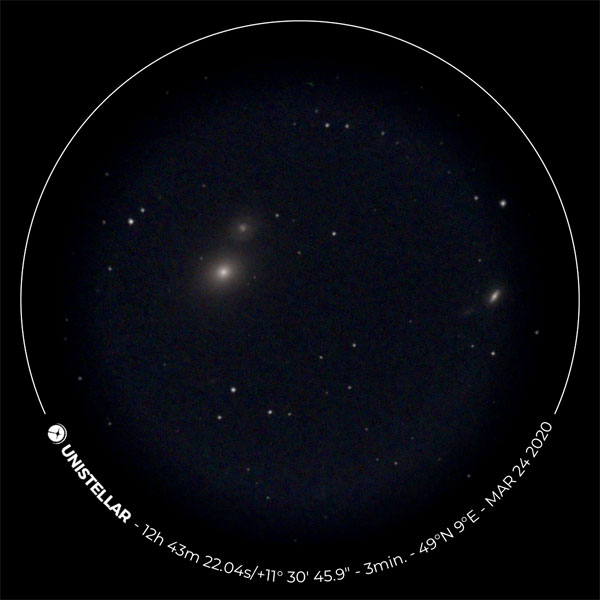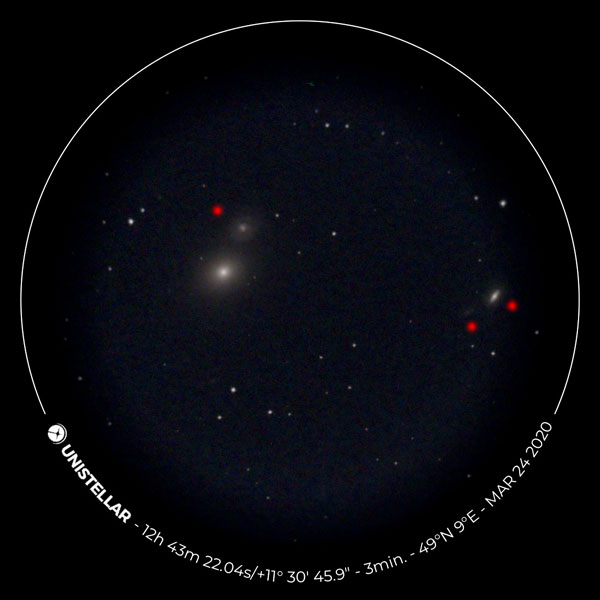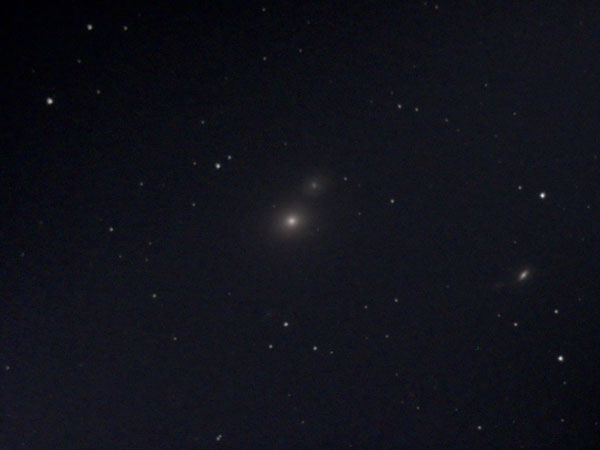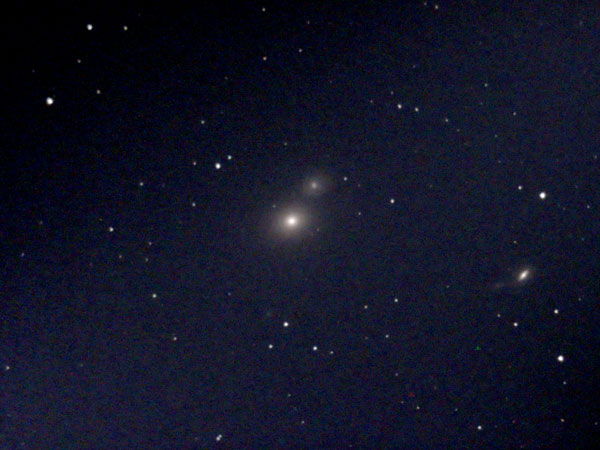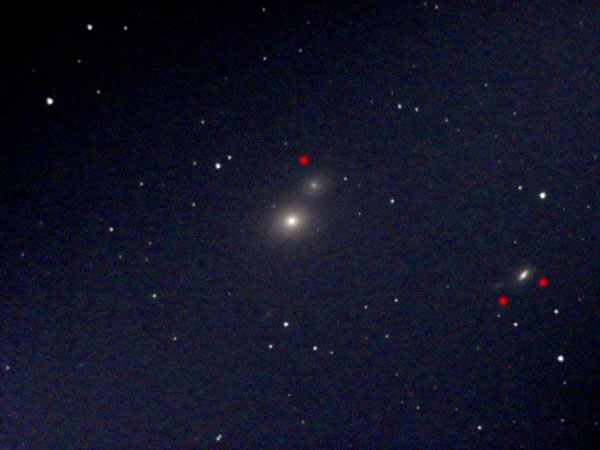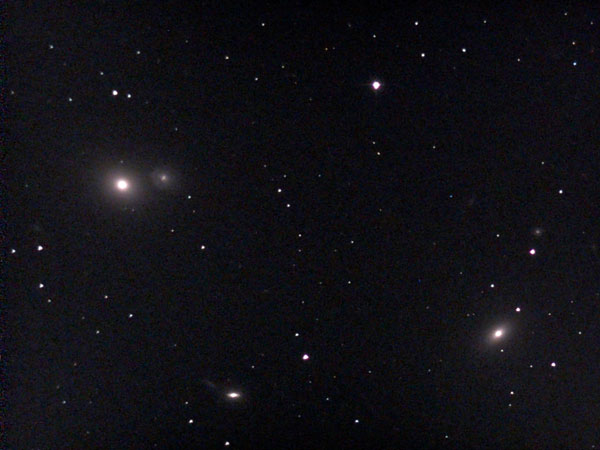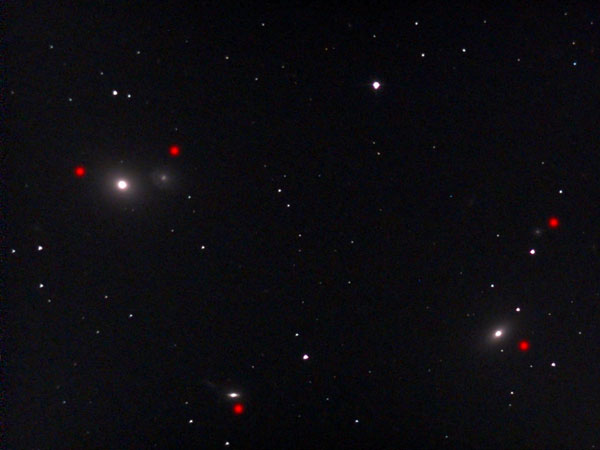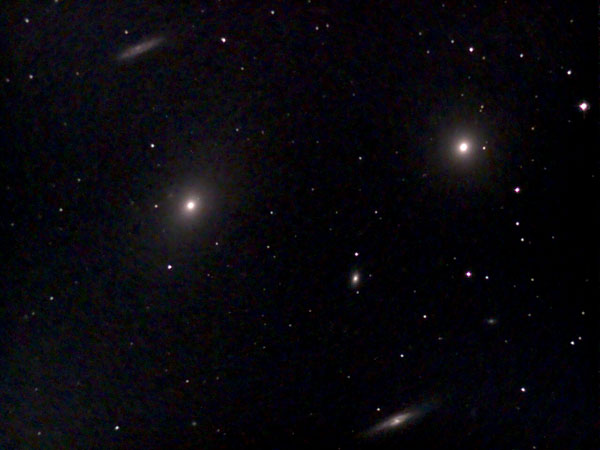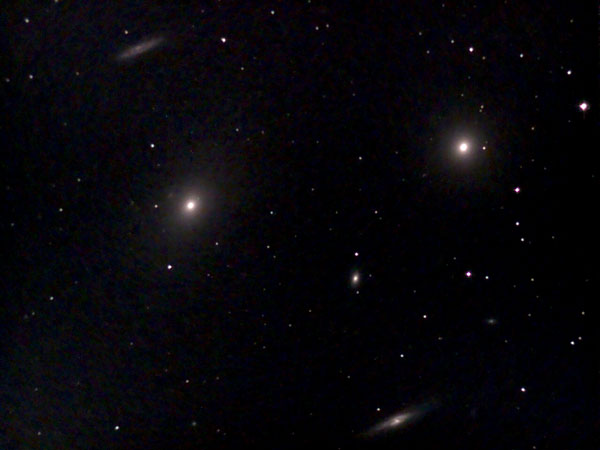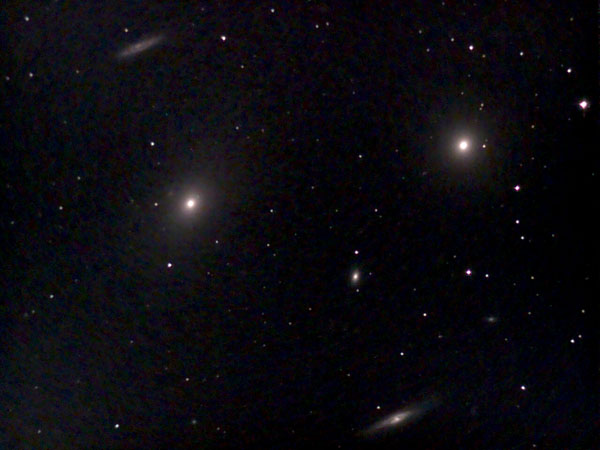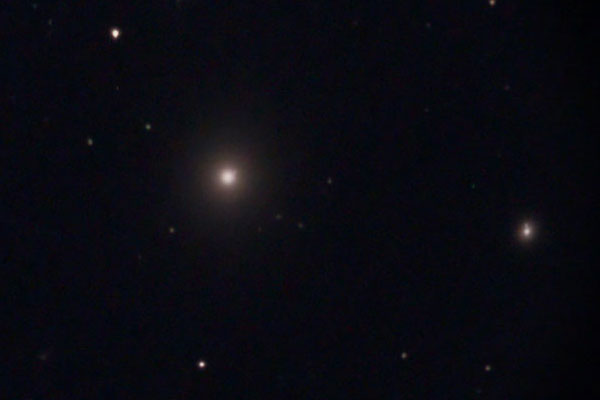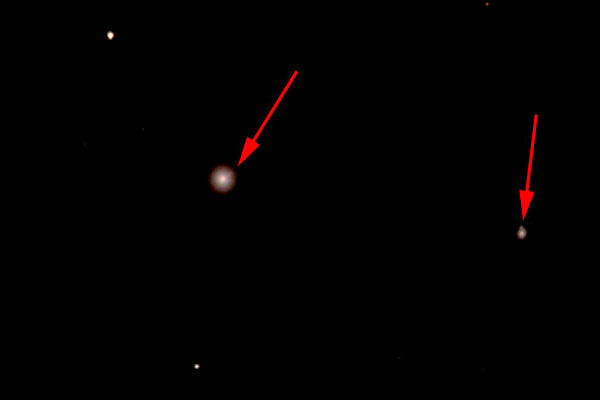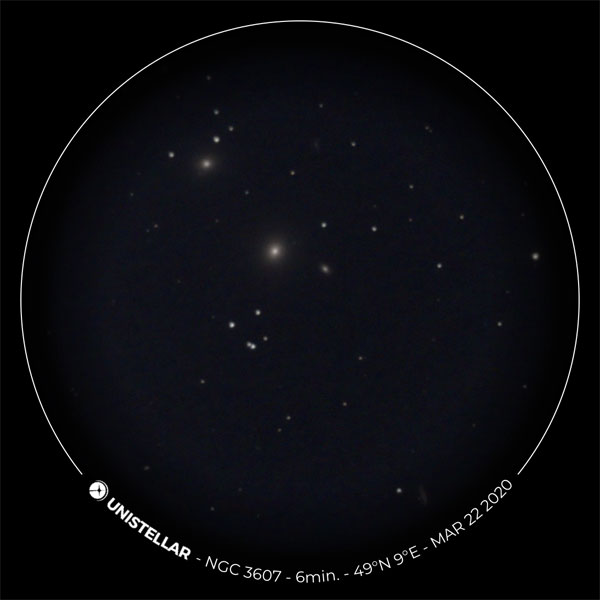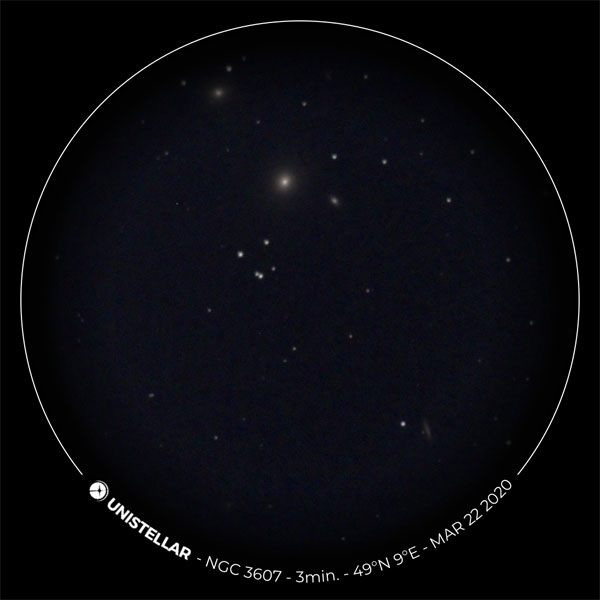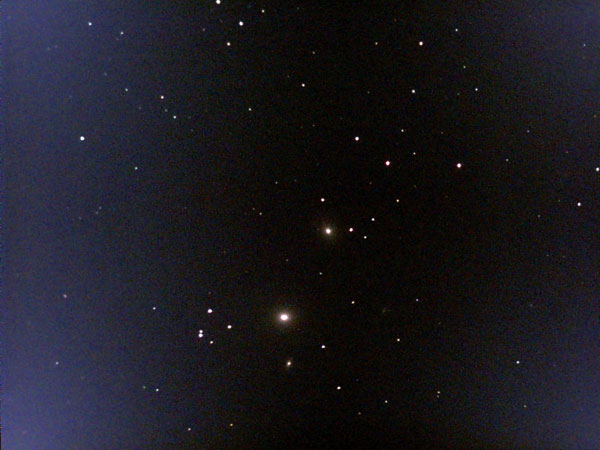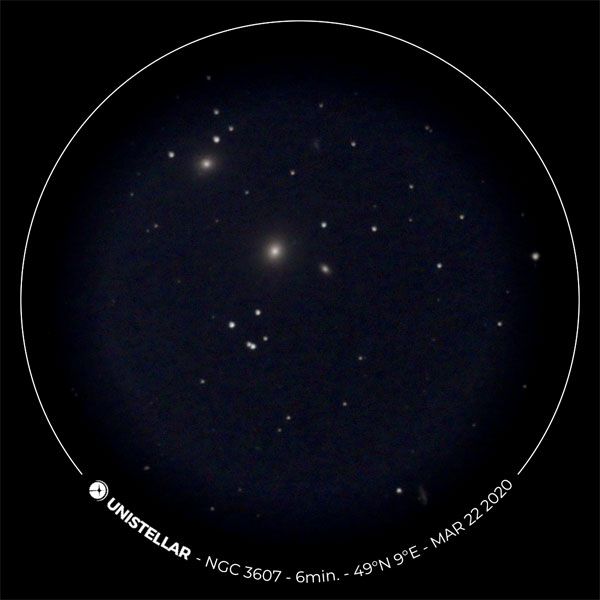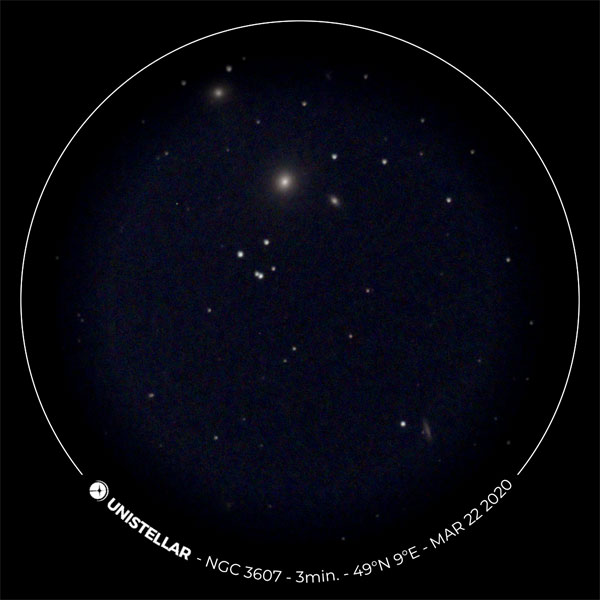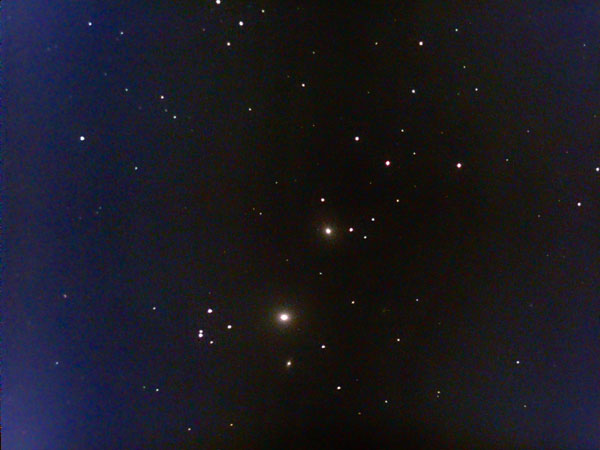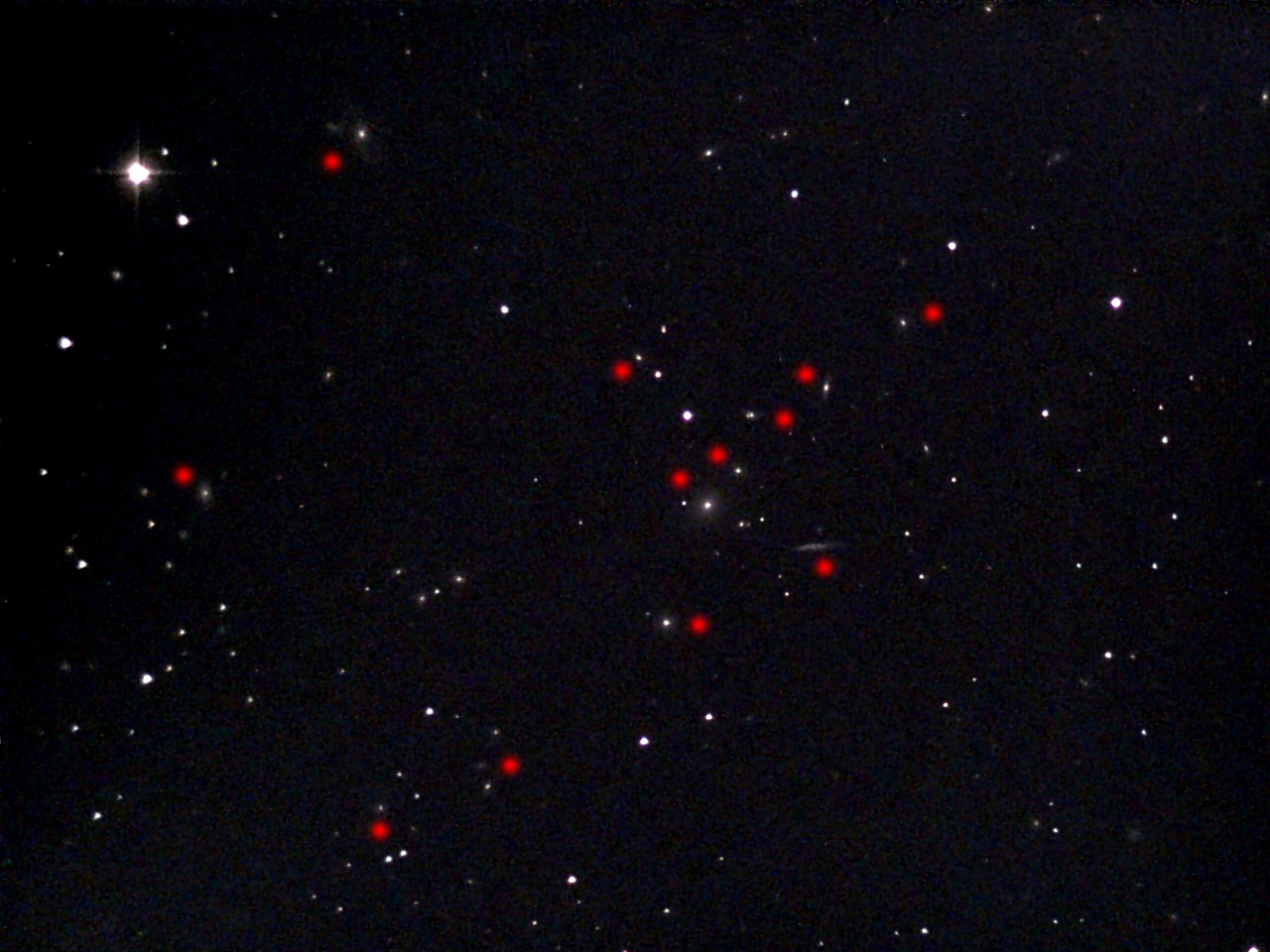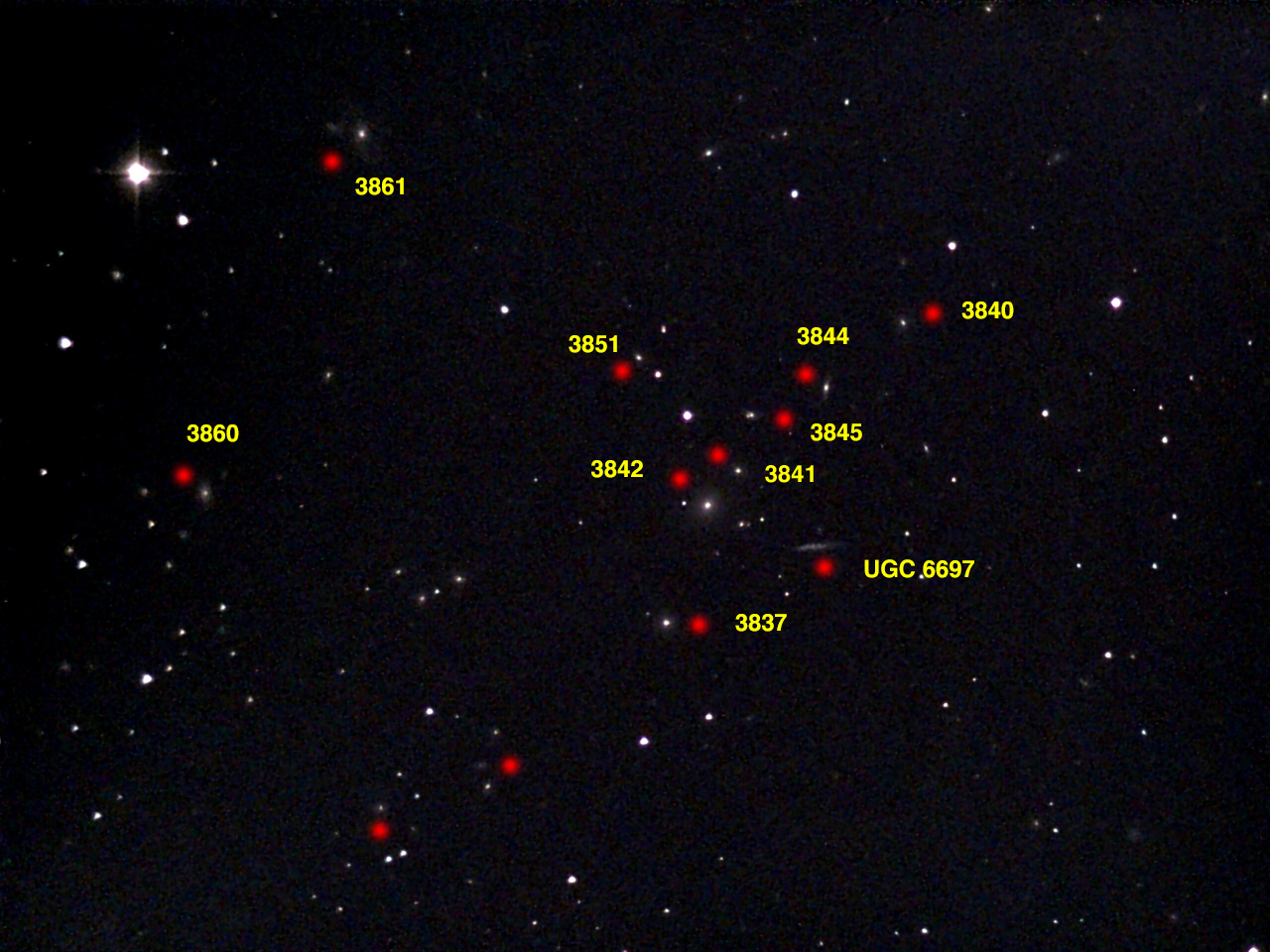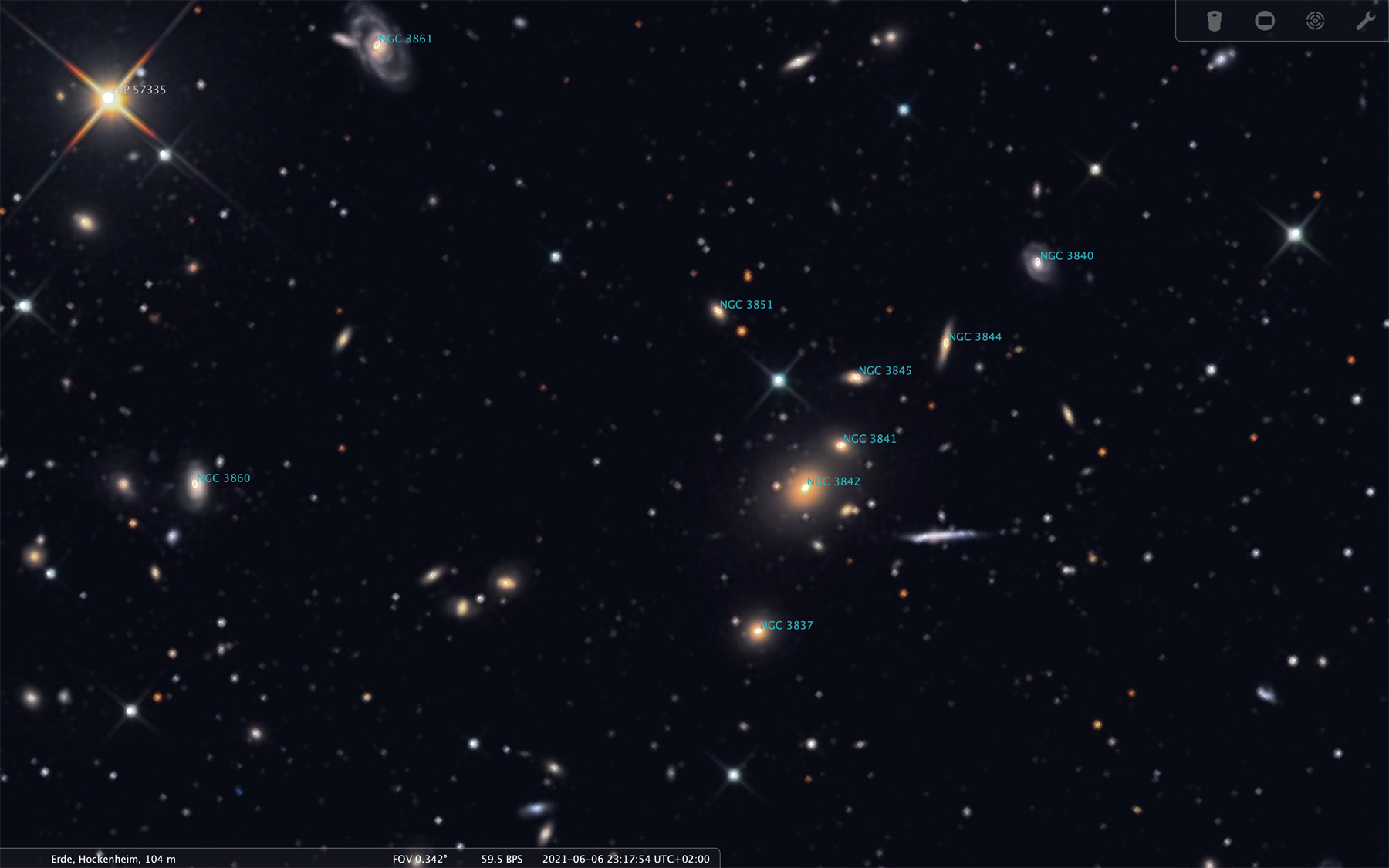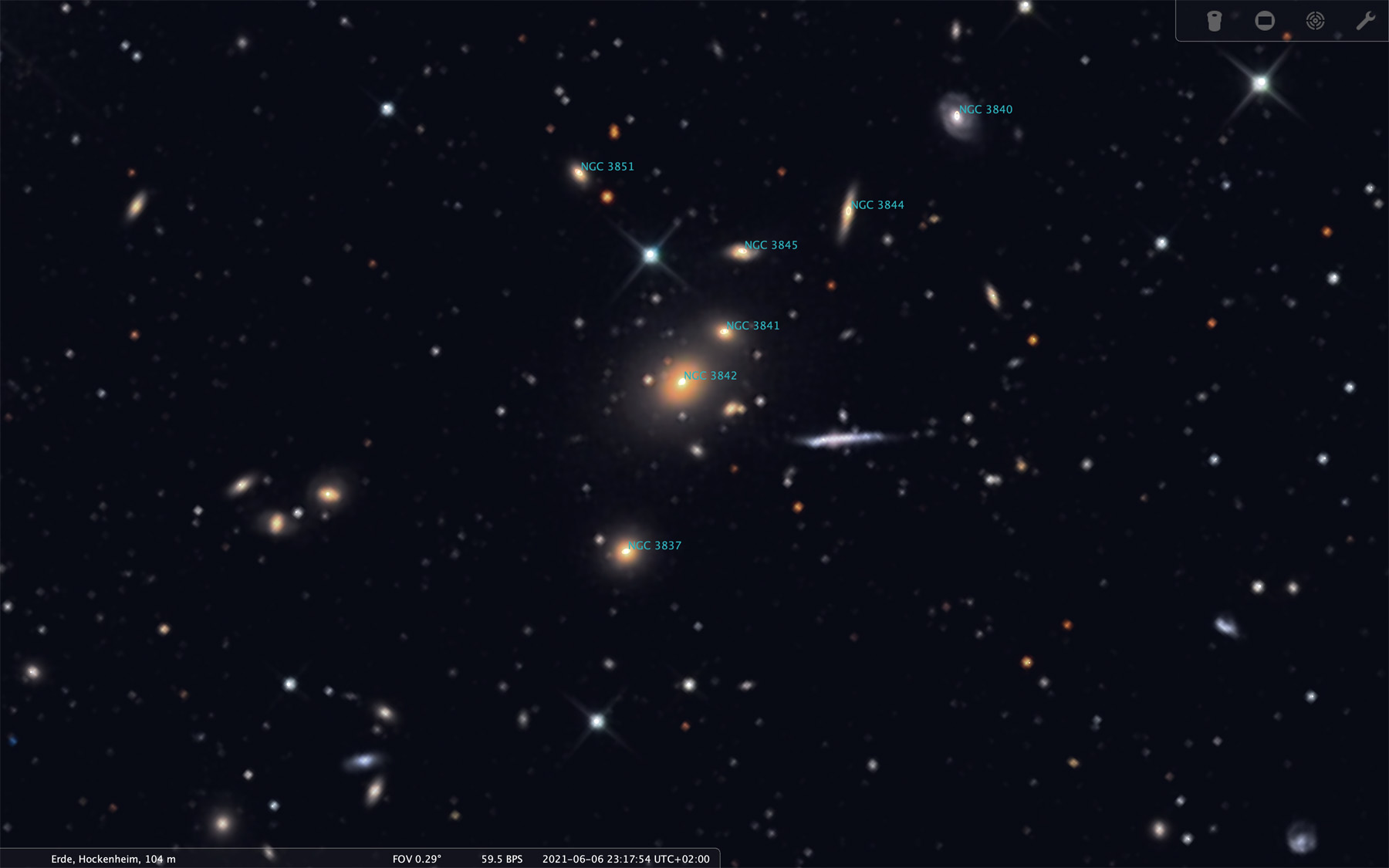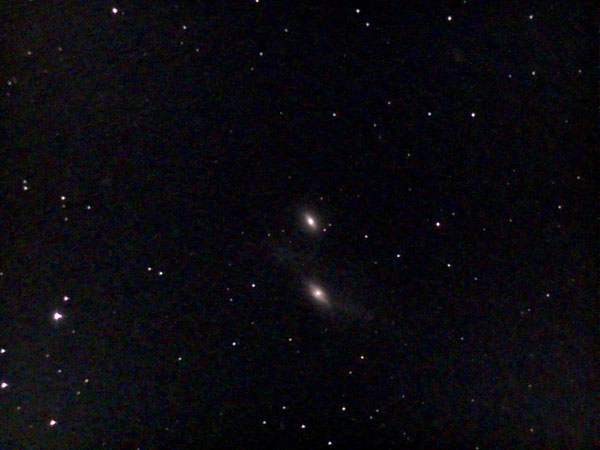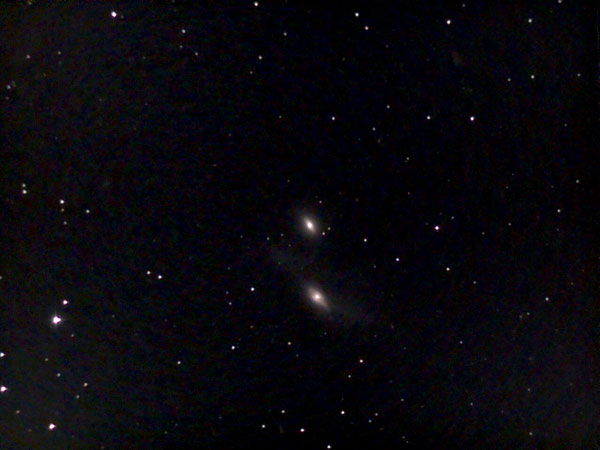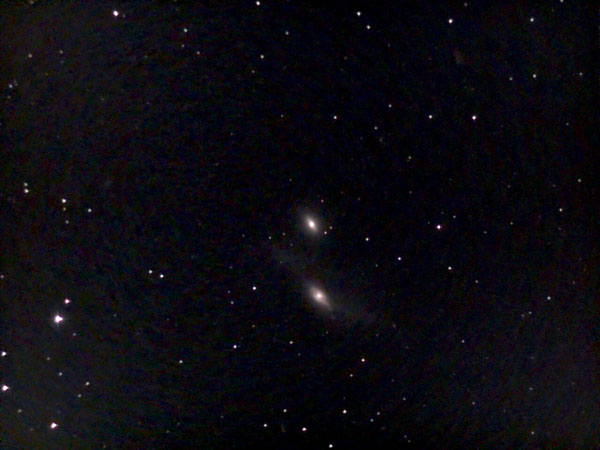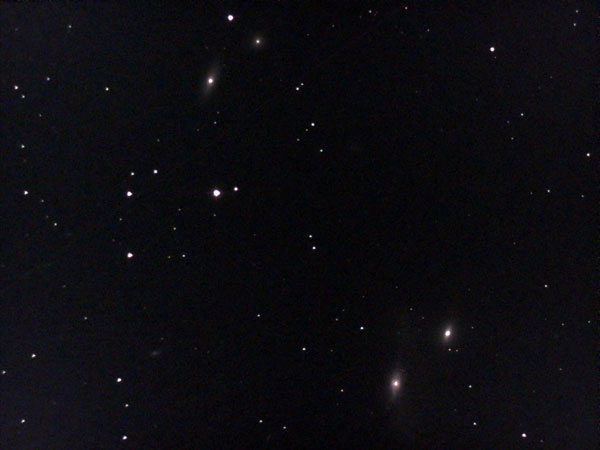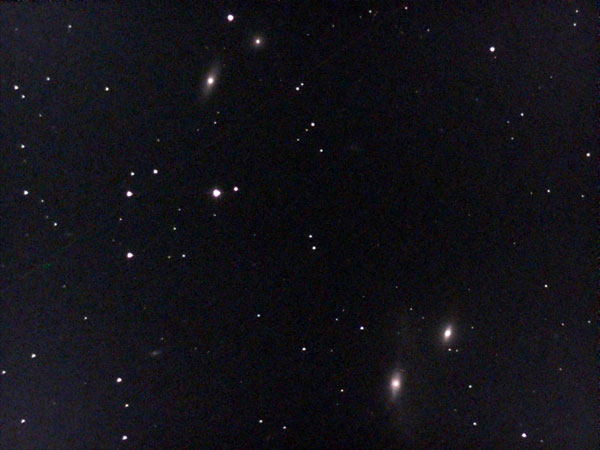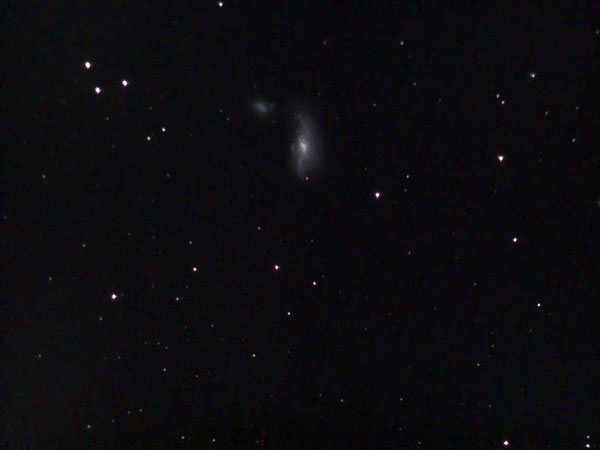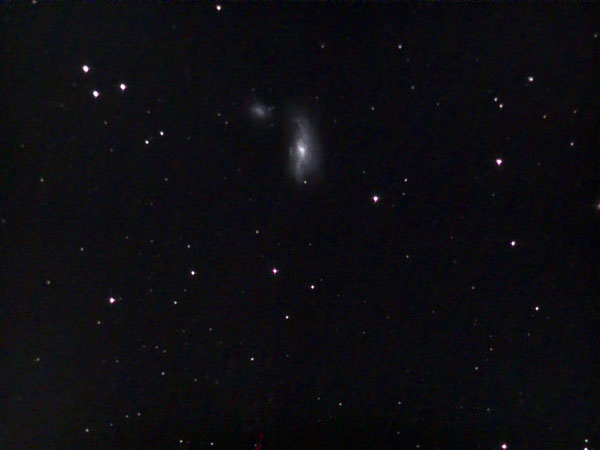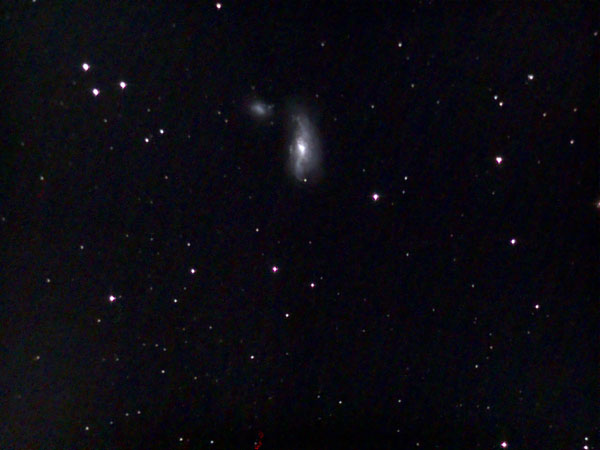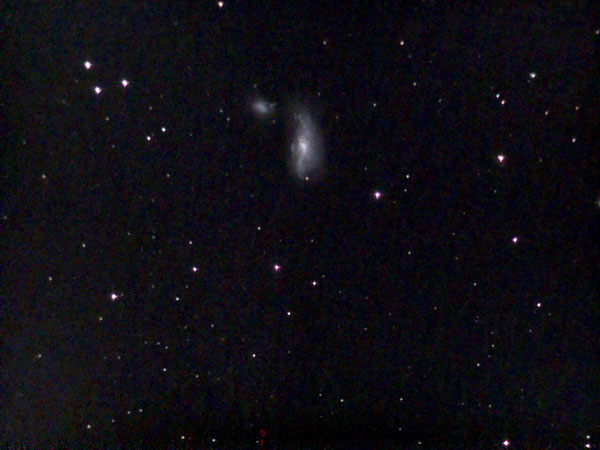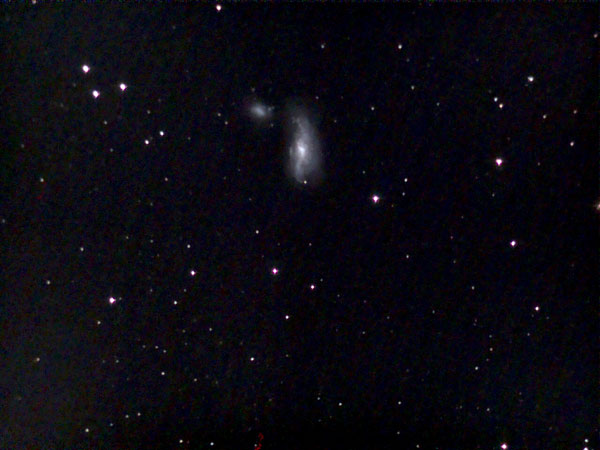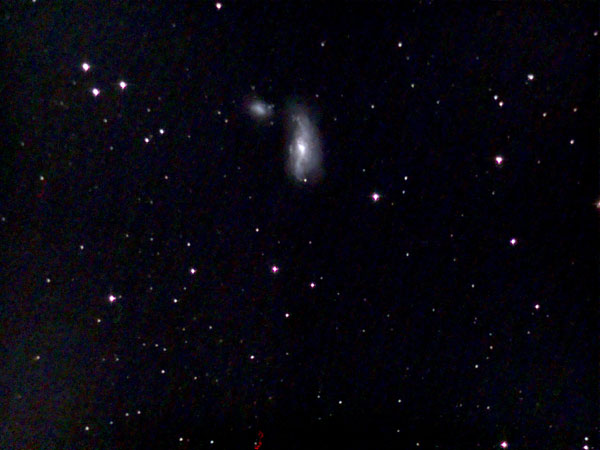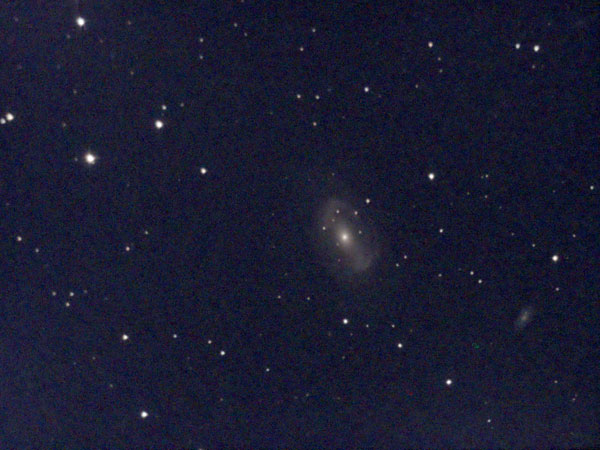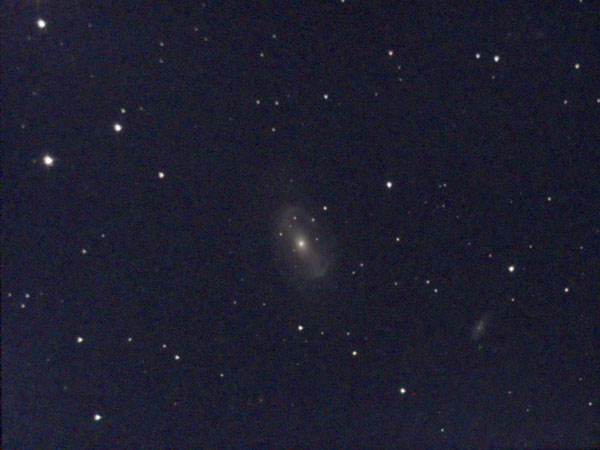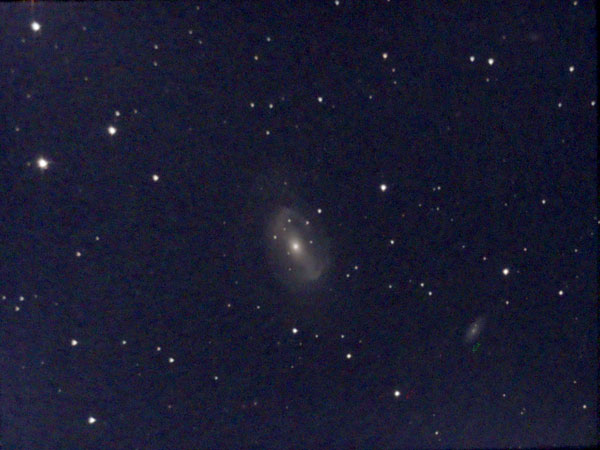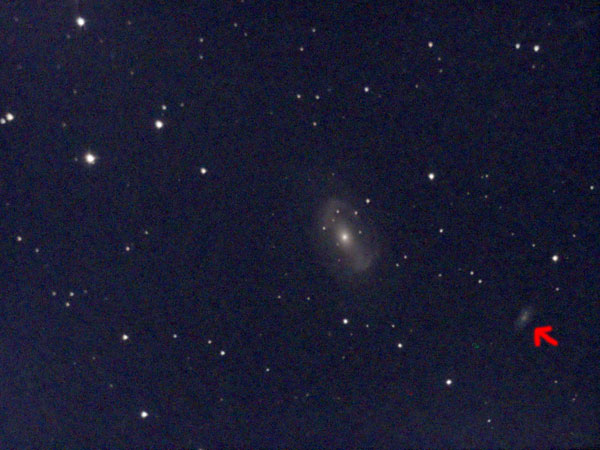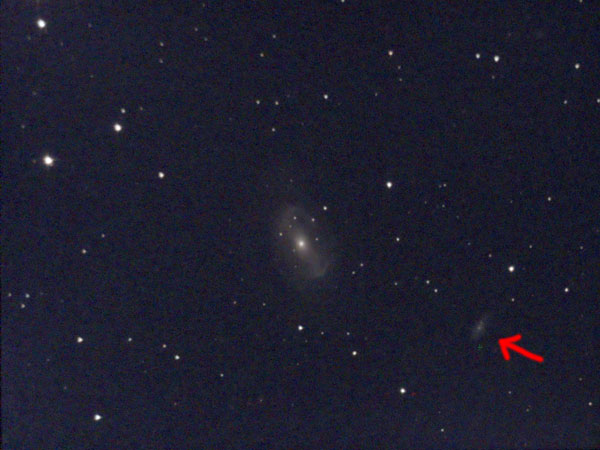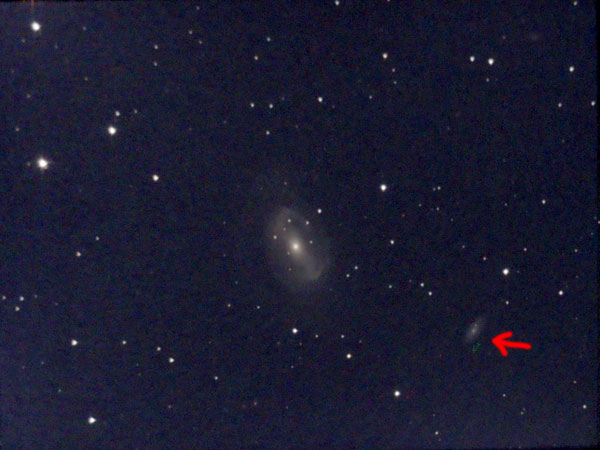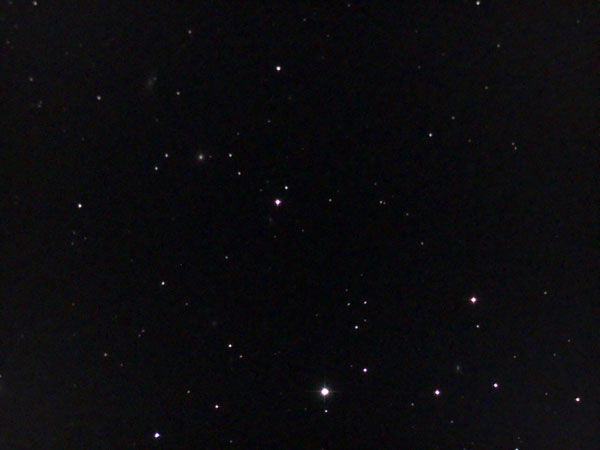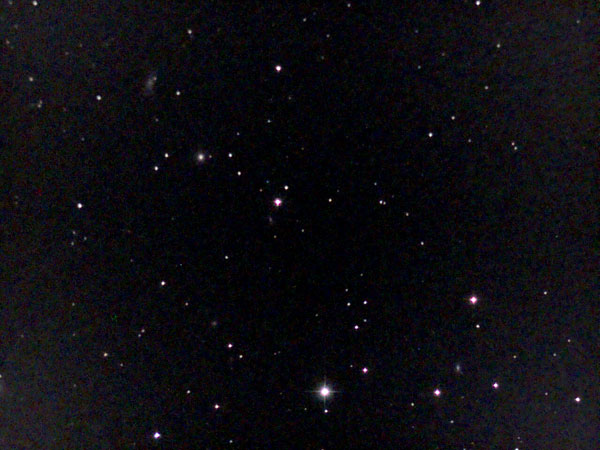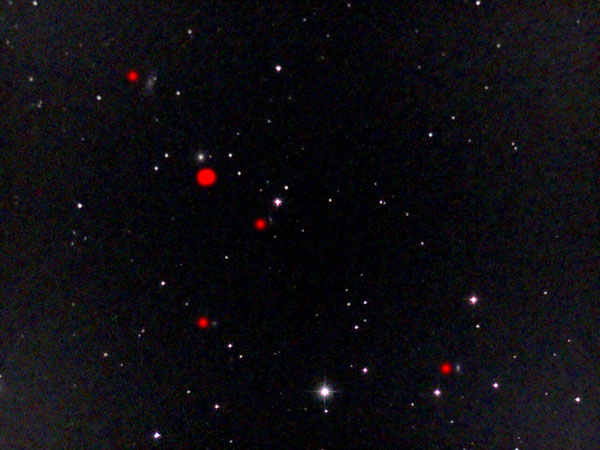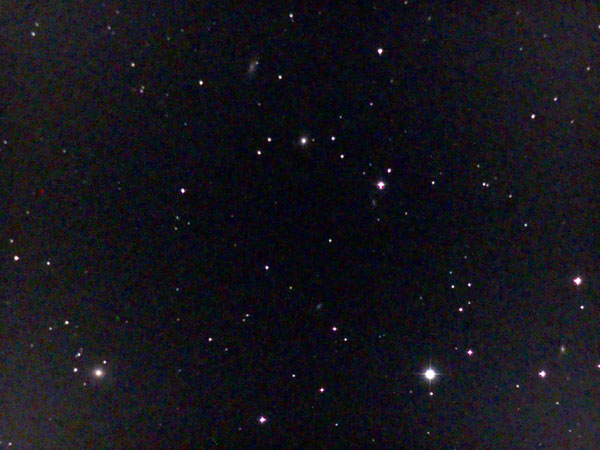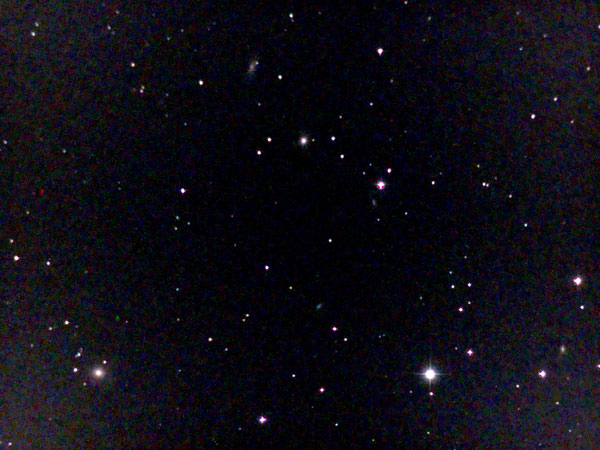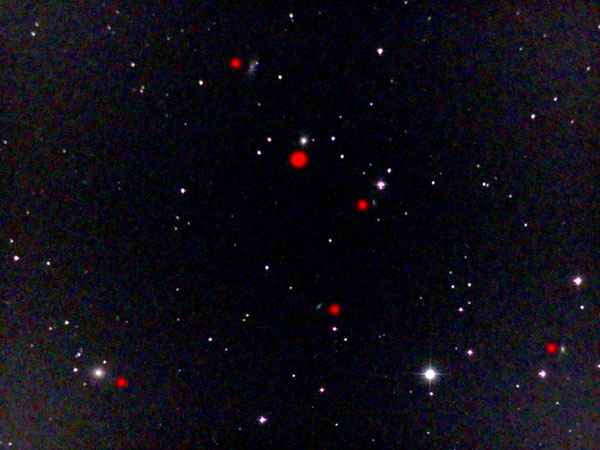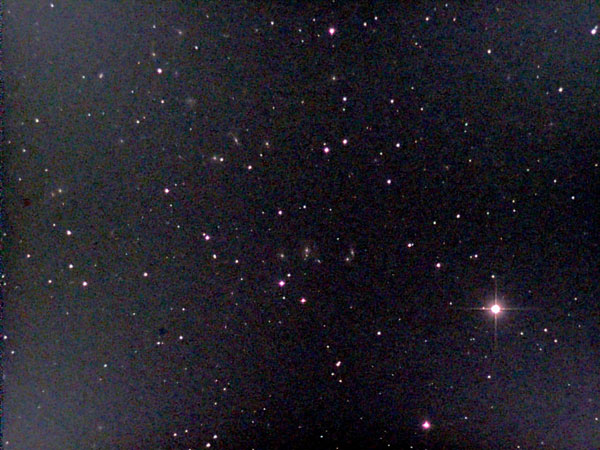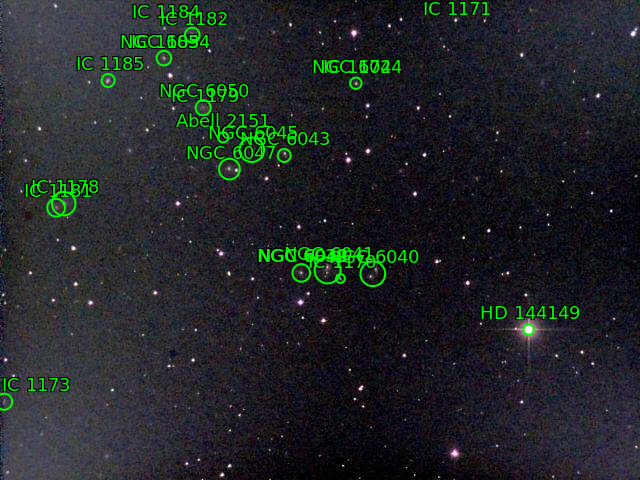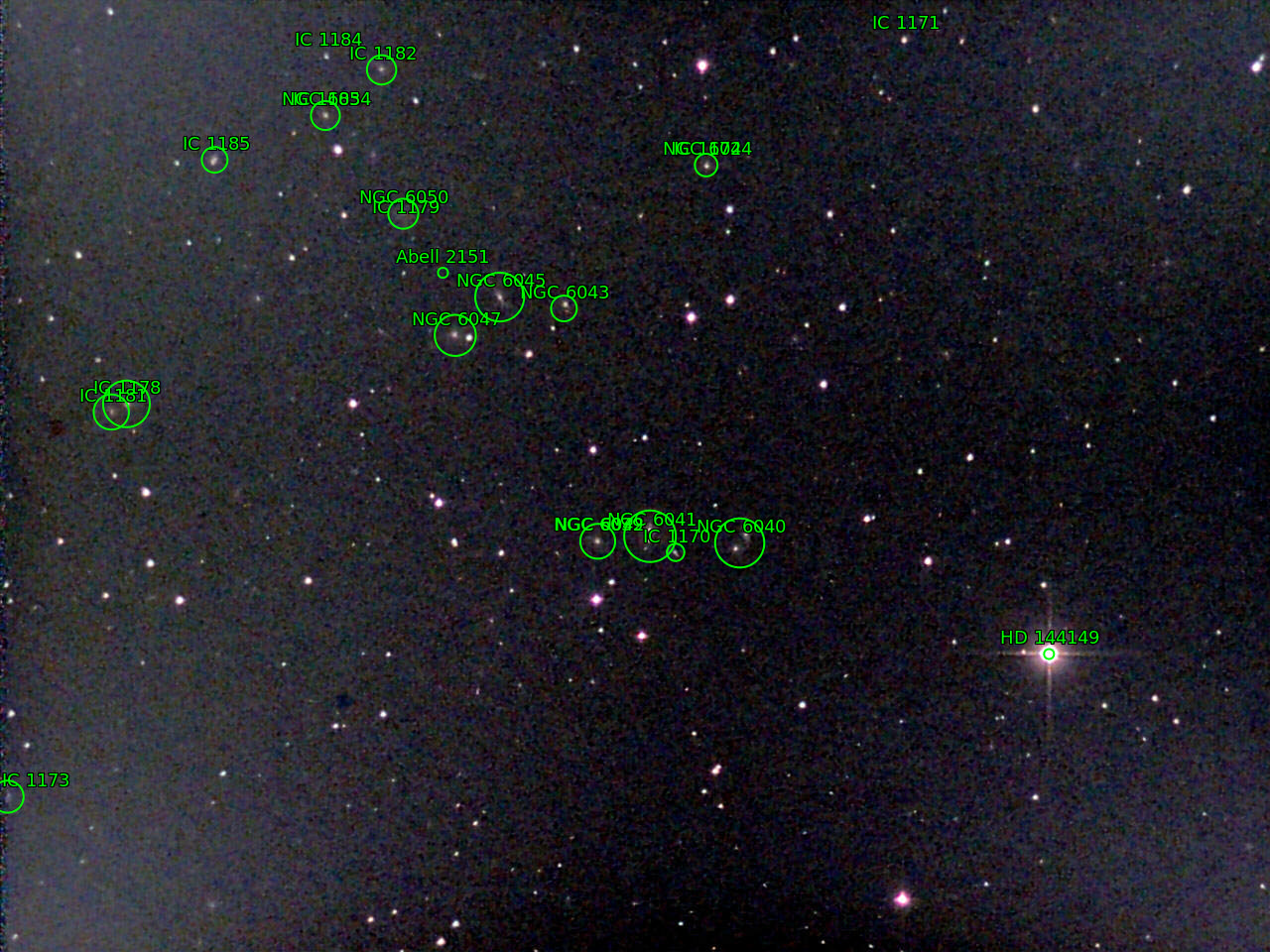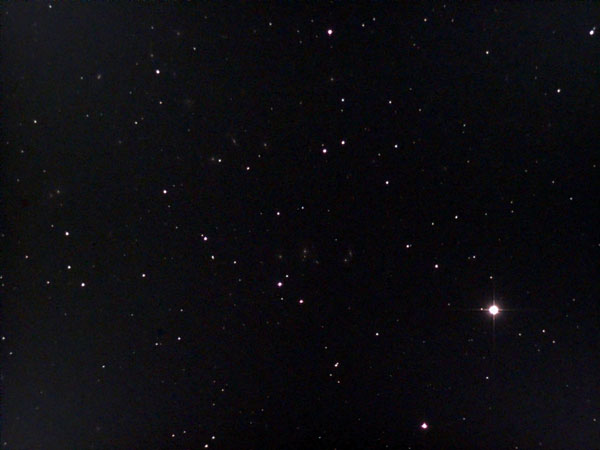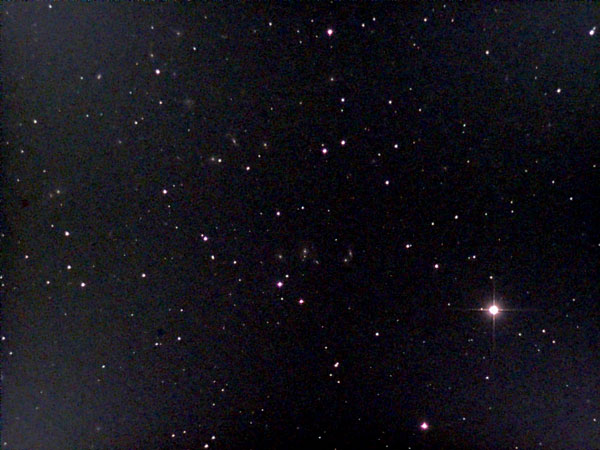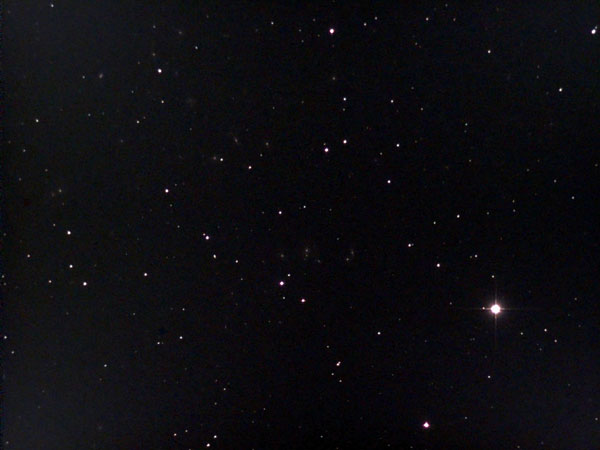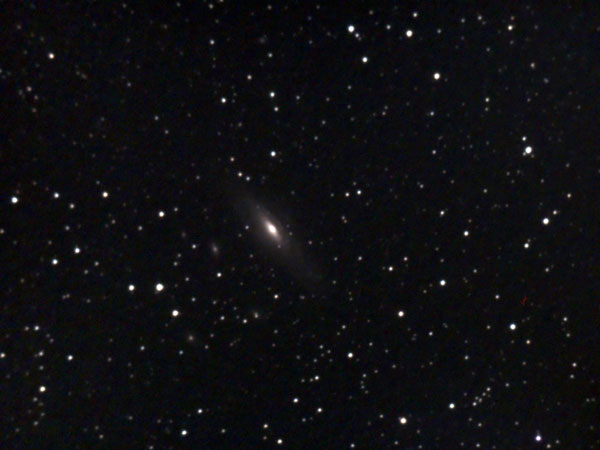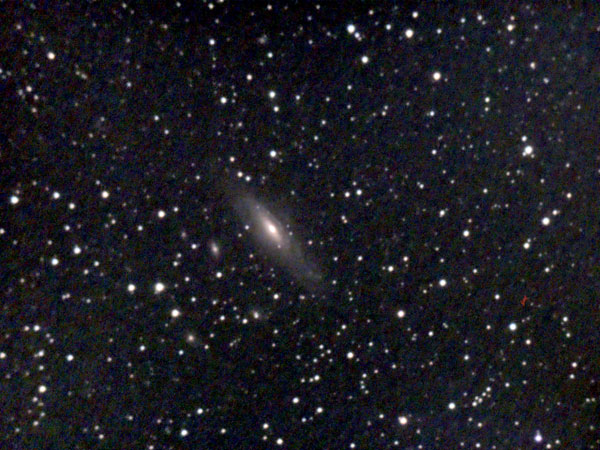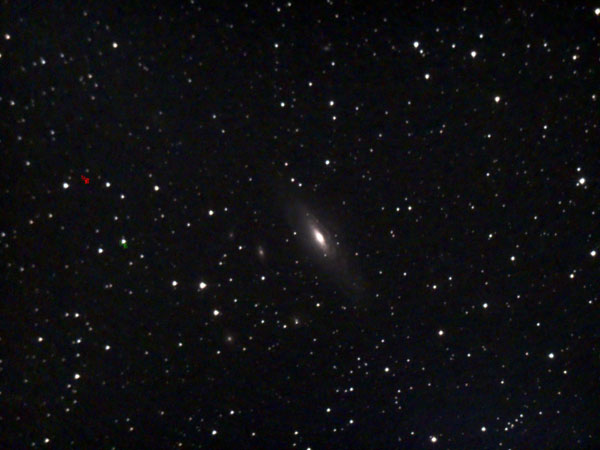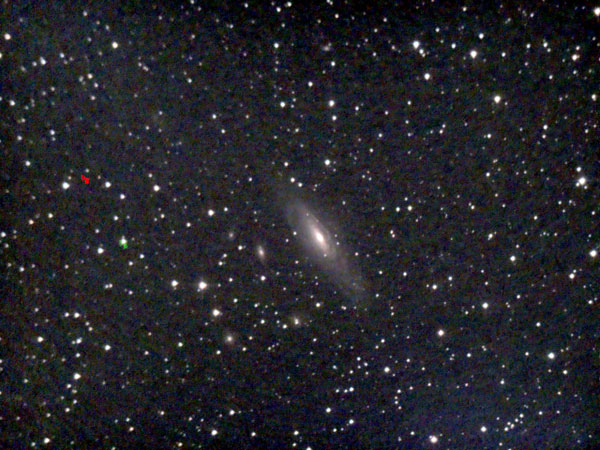Unistellar eVscope - Specialties Gallery Part 3
Overview | Galaxies with Companions | Links
Archive
On this page as well, I present special DSO taken with my Unistellar eVscope. Here, the focus is on several galaxies in the field of view. I also add short explanations.
Note: As I sold my eVscope in mid-March 2022, no more new photos will be added.
I present other "special" objects on pages Unistellar eVscope - Specialty Gallery Part 1 (various objects) and Unistellar eVscope - Specialty Gallery Part 2 (galaxies).
Note: See page Overview of the Unistellar Pages for just that!
Overview
- M 49 with NGC 4470 as well as NGC 4467/64 and 4465 (Virgo)
- M 51 and NGC 5195 (Canes Venatici)
- M 60 and NGC 4647 (plus NGC 4638/37), M 59 (Virgo)
- M 65 and M 66 (Leo)
- M 84 and M 86 (Virgo) + NGC 4387, NGC 4388 (together the Great Galactic Face) - and NGC 4402
- M 87 (Virgo) and NGC 4478
- M 105 (Leo) + NGC 3384 and NGC 3389
- NGC 672/IC 1727 (Holm 46; Triangulum)
- NGC 2805 (Holm 124, Ursa Major)
- NGC 3190 (Hickson 44, Leo Quartet; Arp 316; Leo)
- NGC 3227/26 (Arp 94 or Holm 187; Leo)
- NGC 3607/05/08 (Galaxy Trio Holm 240; Leo)
- NGC 3842 (Abell 1637, Leo Cluster; Leo)
- NGC 4216 with NGC 4206 and NGC 4222 (Virgo)
- NGC 4298/NGC 4302 (Holm 377 or KPG 332; Coma Berenices)
- NGC 4435/38 (The Eyes; Virgo) with and without NGC 4461/58
- NGC 4490, NGC 4485 (Cocoon Galaxies; Canes Venatici; Arp 269, Holm 414 or KPG 341)
- NGC 4567/68 (Siamese Twins, Butterfly Galaxies; Virgo)
- NGC 4631 (Whale/Herring Galaxy; Canes Venatici) and NGC 4627
- NGC 4725 (Coma Berenices) and NGC 4712
- NGC 5173 (Canes Venatici)
- NGC 5426 and NGC 5427 (Arp 271; Virgo)
- NGC 5981/82/85 (Draco Triplet; Draco)
- NGC 6041 (Abell 2151, Hercules Cluster; Hercules)
- NGC 7317 (Stephan's Quintet; Pegasus)
- NGC 7331 (close to Stephan's Quintet; Pegasus)
- NGC 7332/7339 (Pegasus)
Galaxies with Companions
M 49 with NGC 4470 as well as NGC 4467/64 and 4465 (Virgo)
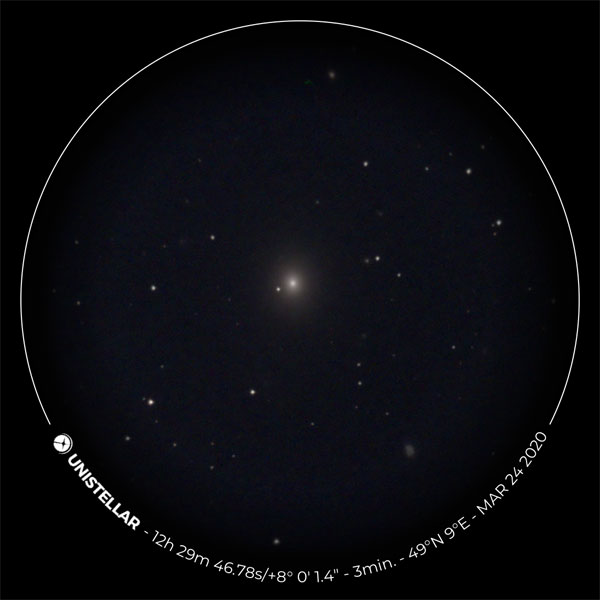 |
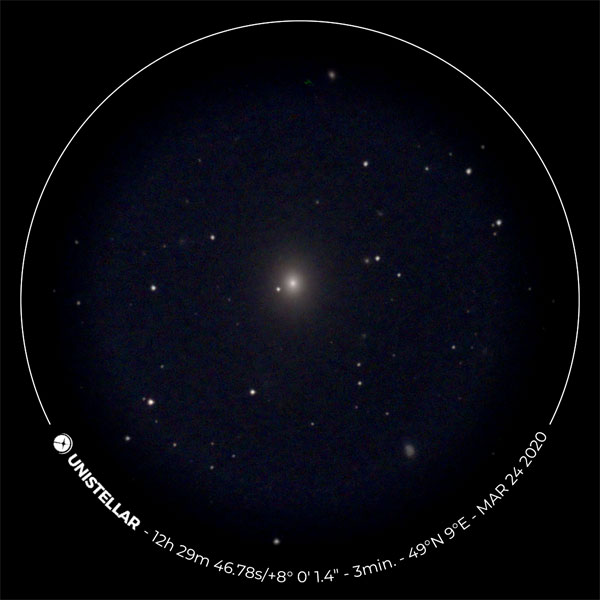 |
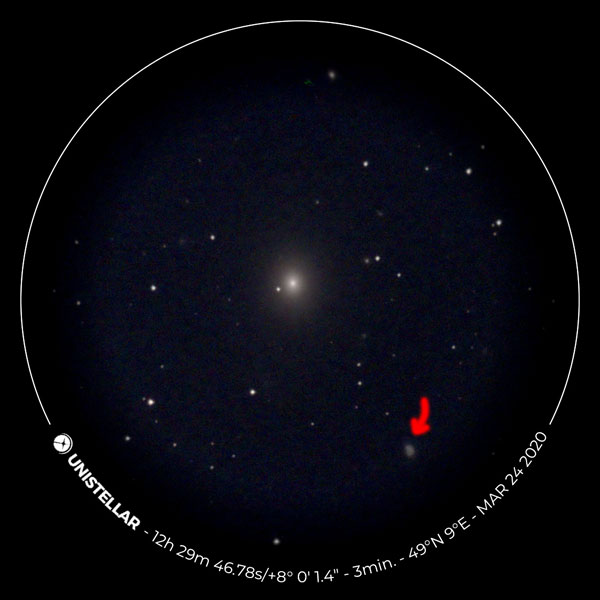 |
||
M 49 - Mar 24, 2020 |
M 49 - Mar 24, 2020, processed |
M 49 - Mar 24, 2020, processed (NGC 4470 marked at the bottom right) |
The galaxy M 49 in the constellation Virgo is, according to Karkoschka (Stoyan confirms this) the brightest galaxy of the Virgo galaxy cluster and a large luminous galaxy. In the lower right corner the spiral galaxy NGC 4470 is faintly visible (see arrow). There are some more very faint galaxies on the photo or in the vicinity of M 49, such as NGC 4467, 4464 and 4465. Here is a map of the neighborhood of M 49 with marked galaxies.
M 51 and NGC 5195 (Canes Venatici)
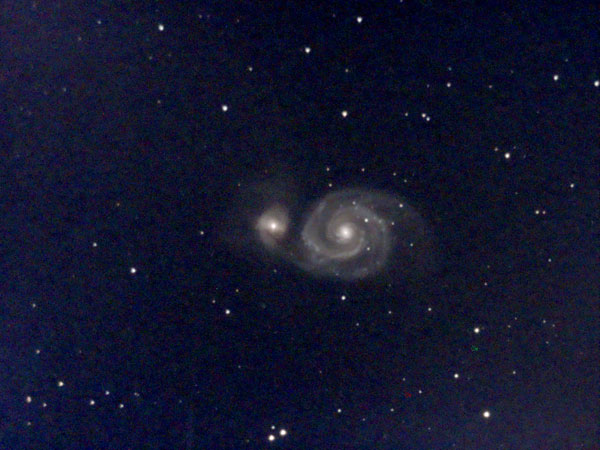 |
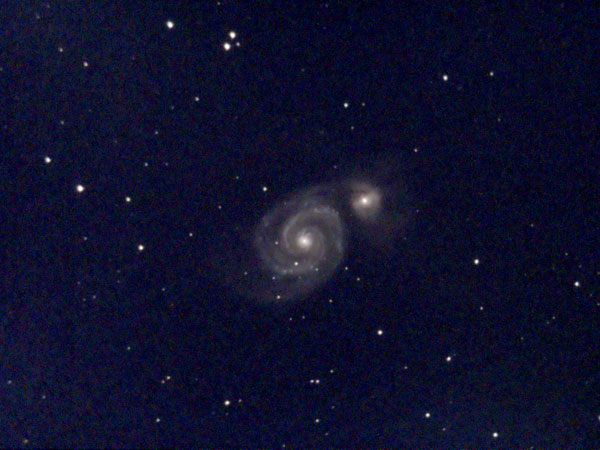 |
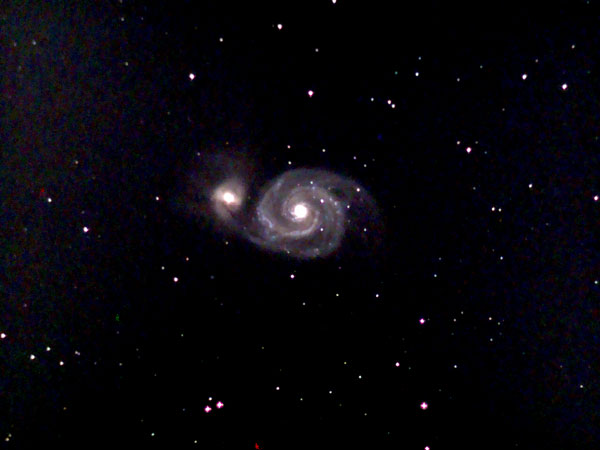 |
||
M 51 - Apr 22, 2020, processed |
M 51 - Jun 12, 2020, processed |
M 51 - Mar 6, 2021, processed |
The spiral galaxy M 51 in the constellation Canes Venatici is also called Whirlpool galaxy. According to Karkoschka, it is easily visible with its bright core, but the long spiral arms are only faintly visible even in the telescope. A spiral arm winds to the galaxy NGC 5195. Stoyan writes that there are two interacting galaxies: NGC 5194 (= M 51) and NGC 5195.
M 60 and NGC 4647 (plus NGC 4638/37), M 59 (Virgo)
The elliptical galaxy M 60 in the constellation Virgo has an interacting satellite with the spiral galaxy NGC 4647; nearby, and sometimes in the field of view of the eVscope, are the galaxies NGC 4638 and the even smaller and hardly recognizable galaxy NGC 4637. If you move the field of view, you can also see M 59 in the same field of view.
M 65 and M 66 (Leo)
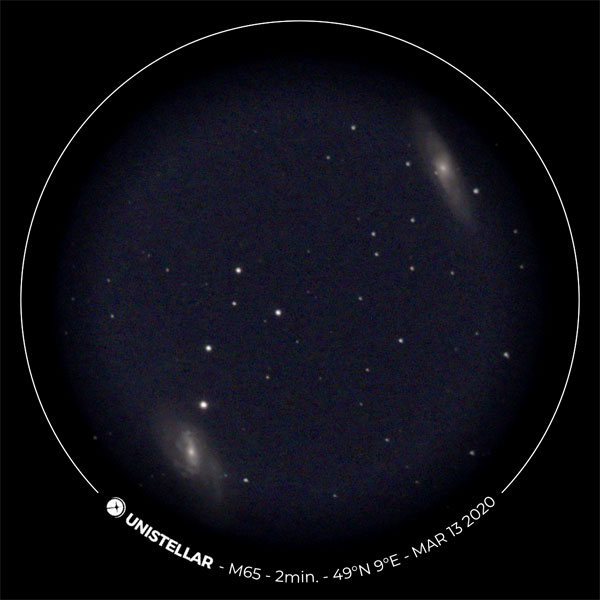 |
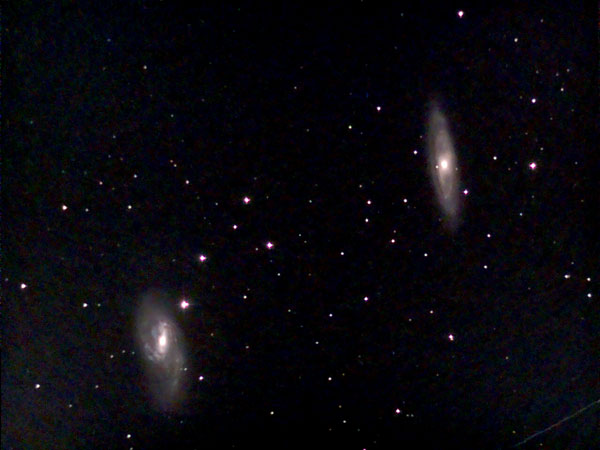 |
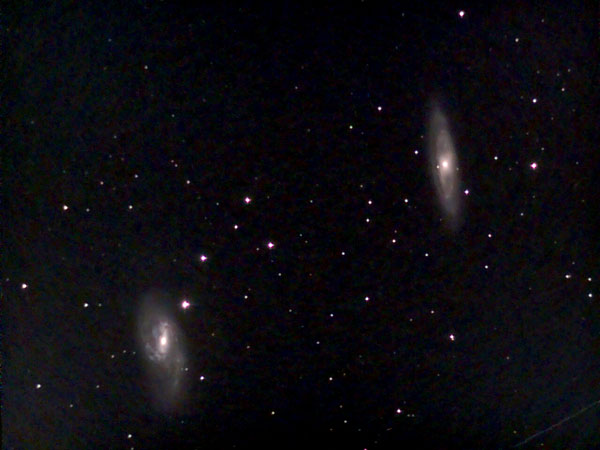 |
||
M 65 & M 66 - Mar 13, 2020, processed |
M 65 & M 66 - Mar 8, 2021, processed |
M 65 & M 66 - Mar 8, 2021,processed |
The two spiral galaxies M 65 and M 66 in constellation Leo can be observed together in the eVscope. The fit is a bit tight with an overlay, but they fit well the rectangular format without overlay. Both galaxies belong, together with galaxy NGC 3628, to the Leo Triplet (M 66 Group, Arp 317), which cannot be observed as a whole in the eVscope.
M 84 and M 86 (Virgo) + NGC 4387, NGC 4388 (Together the Great Galactic Face) - and NGC 4402
The galaxies M 84 and M 86 in constellation Virgo can be observed together in the eVscope, and also together with the galaxy NGC 4387 and sometimes even together with the galaxies NGC 4388 and NGC 4402. For an optimal positioning of all galaxies, access NGC 4387.
According to the Stellarium application, M 84 and M 86 form, together with NGC 4387 and NGC 4388, the "great galactic face."
M 87 (Virgo) and NGC 4478
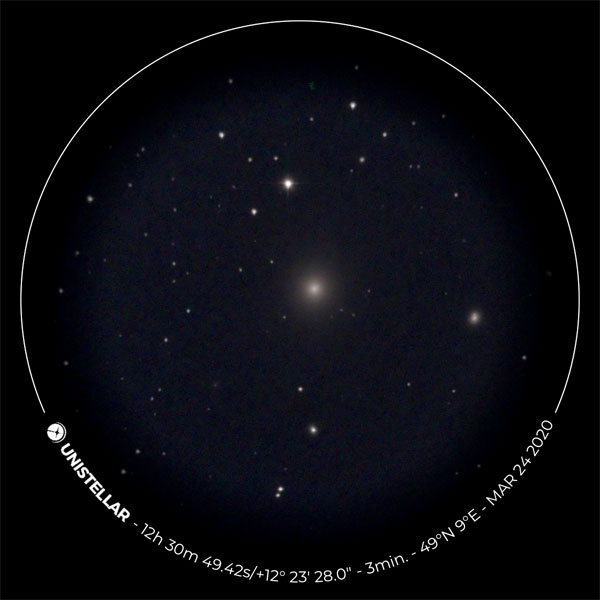 |
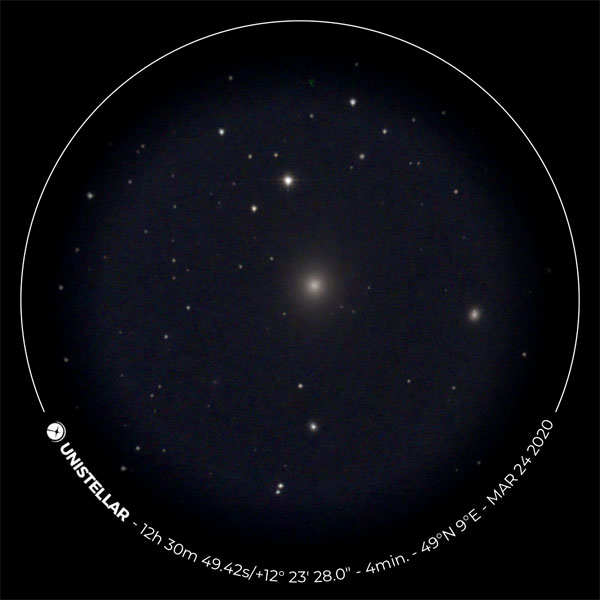 |
|
M 87 (+ NGC 4478) - Mar 24, 2020, processed |
M 87 (+ NGC 4478) - Mar 24, 2020, processed |
The elliptical galaxy M 87 in constellation Virgo can be observed together with the elliptical galaxy NGC 4478 in the eVscope.
It was not until early 2021 that I was informed by a star friend that there is a huge black hole at the center of M 87, whose activity makes M 87 one of the brightest radio and X-ray sources in the sky. A jet emanates from the galaxy's core, accelerating matter to nearly the speed of light. It can be observed visually only with large telescopes. It is, however, possible to photograph the jet - and I even managed to do so with the eVscope, as the following photos demonstrate:
Larger versions of the photos can be found here!
M 105 (Leo) + NGC 3384 and NGC 3389
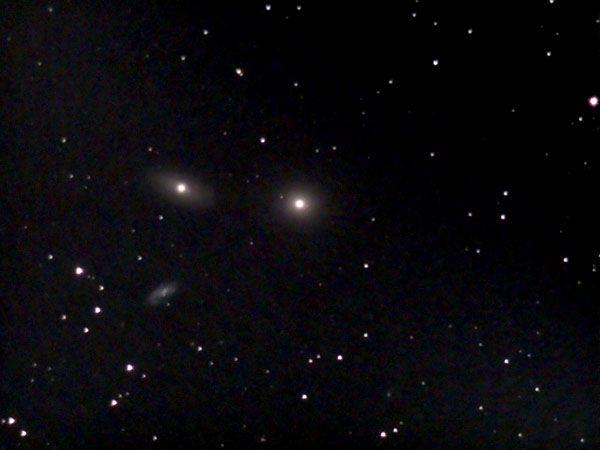 |
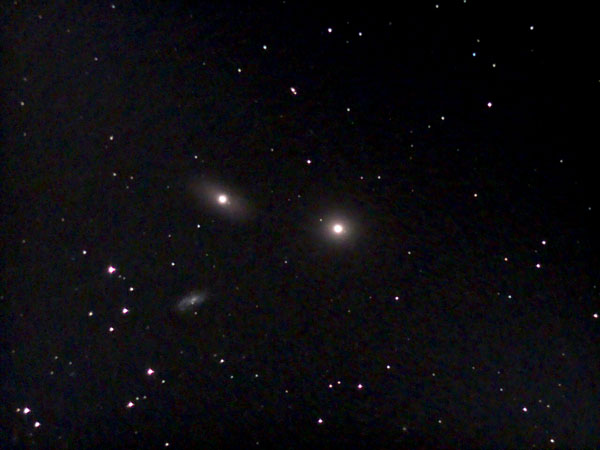 |
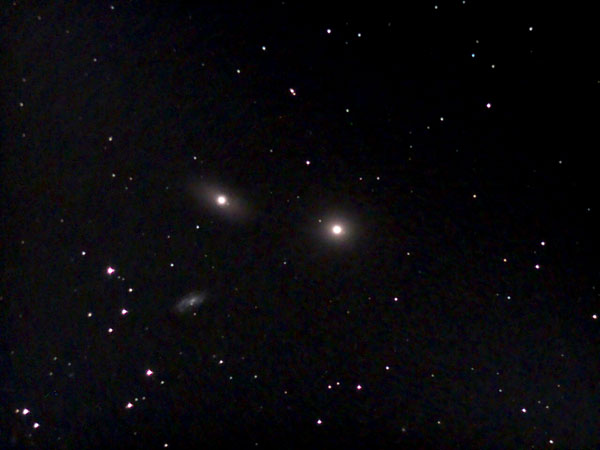 |
||
M 105 (+ NGC 3384 und NGC 3389) - Mar 7, 2021, processed |
M 105 (+ NGC 3384 und NGC 3389) - Mar 8, 2021, processed |
M 105 (+ NGC 3384 und NGC 3389) - Mar 8, 2021 |
The galaxy M 105 in constellation Leo can be observed together with the two galaxies NGC 3384 and NGC 3389 in the eVscope. They form a galaxy trio in the galaxy group Leo I, which also includes M 95 and M 96.
NGC 672/IC 1727 (Holm 46; Triangulum)
NGC 672 in the constellation Triangulum is a barred spiral galaxy with extensive star-forming regions. Together with the barred spiral galaxy IC 1727, which is less than 90,000 light years away, it forms the gravitationally bound galaxy pair Holm 46.
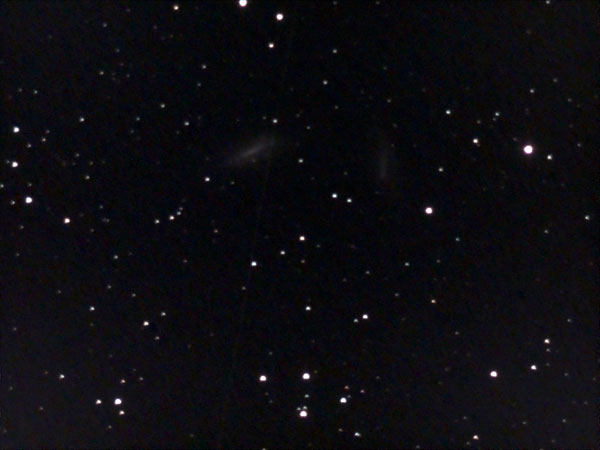 |
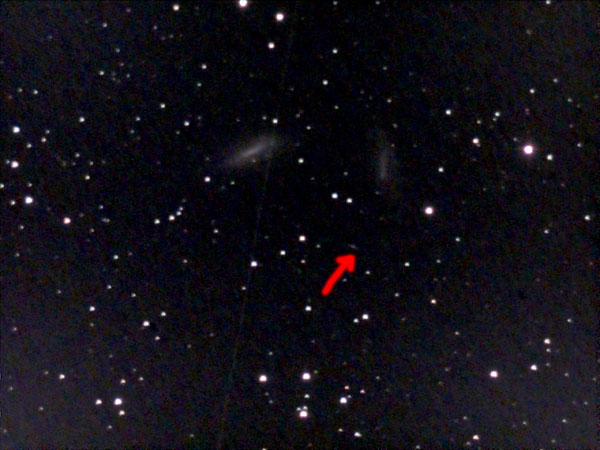 |
|
NGC 672 - Oct 9, 2021 |
NGC 672 - Oct 9, 2021, PGC 1803573 marked |
|
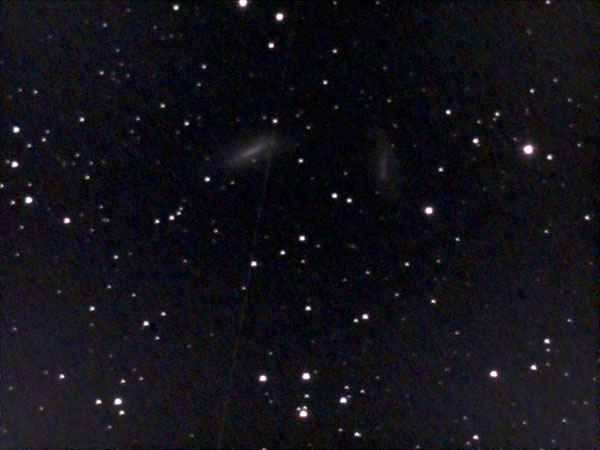 |
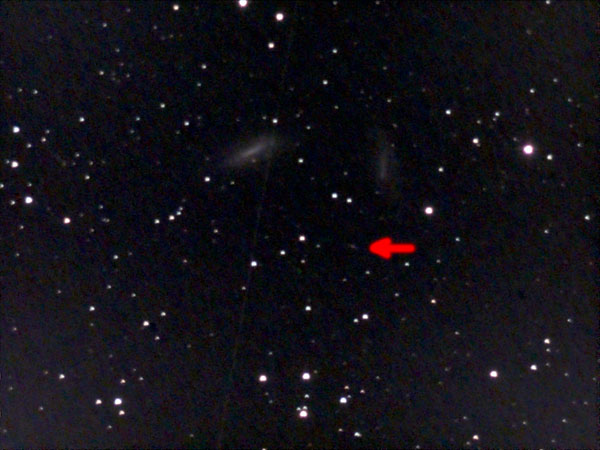 |
|
NGC 672 - Oct 9, 2021, photo on top processed |
NGC 672 - Oct 9, 2021, ditto |
The arrow points to the galaxy PGC 1803573.
NGC 2805 (Holm 124; Ursa Major)
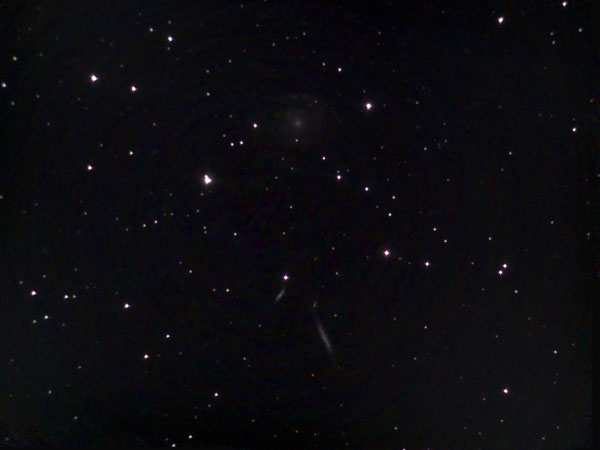 |
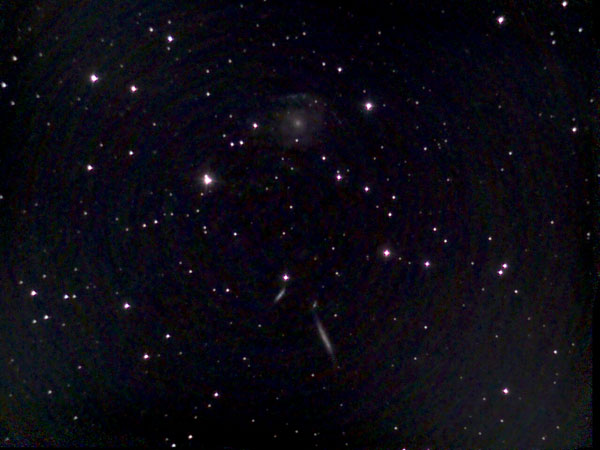 |
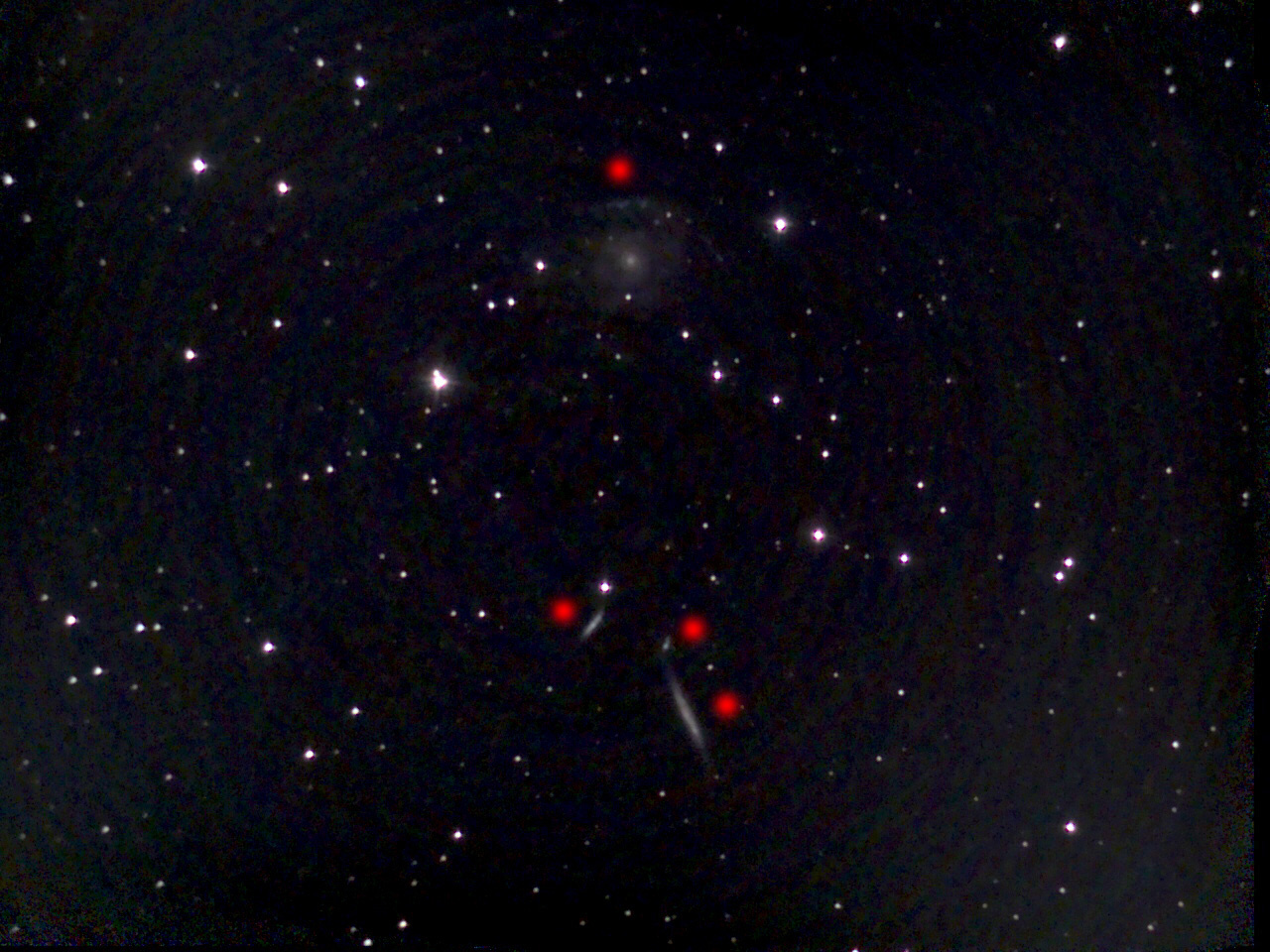 |
||
NGC 2805 - Mar 8, 2021 |
NGC 2805 - Mar 8, 2021, photo left processed |
NGC 2805 - Mar 8, 2021, ditto, galaxies marked* |
*) Top: NGC 2805, bottom left: NGC 2814; bottom right and larger: NGC 2820, on top of it perhaps UGCA 159
The barred spiral galaxy NGC 2805 in the constellation Ursa Major forms together with NGC 2814, NGC 2820, and IC 2458 the interactive galaxy quartet Holm 124.
NGC 3190 (Hickson 44, Leo Quartet; Arp 316; Leo)
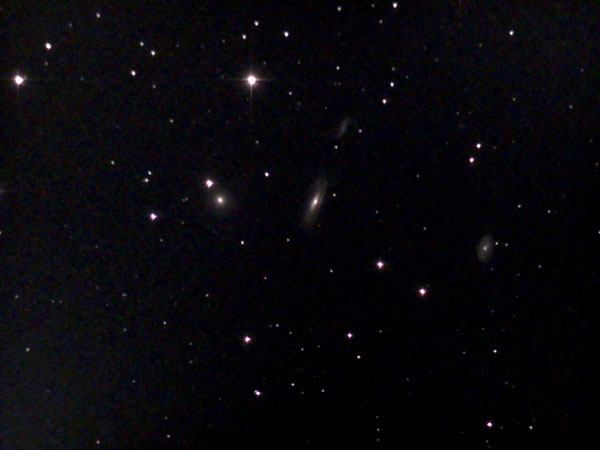 |
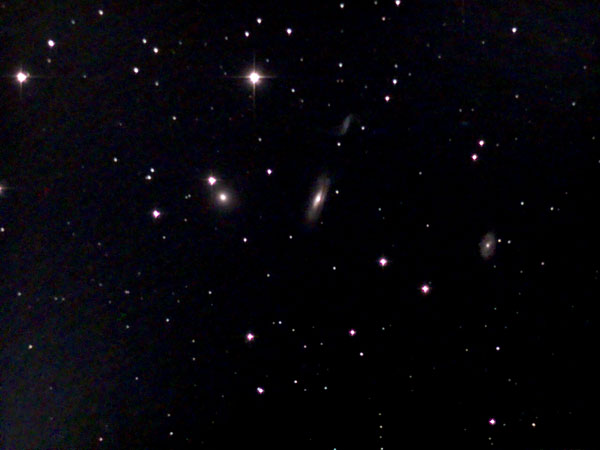 |
 |
||
NGC 3190 - Mar 6, 2021, processed |
NGC 3190 - Mar 6, 2021, processed |
NGC 3190 - Mar 6, 2021, processed |
The spiral galaxy NGC 3190 in the constellation Leo belongs, together with NGC 3185, NGC 3187, and NGC 3193, to the compact galaxy group Hickson 44, also called Leo Quartet. NGC 3190, NGC 3187, and NGC 3193 form the galaxy group Arp 316.
NGC 3227/26 (Arp 94 or Holm 187; Leo)
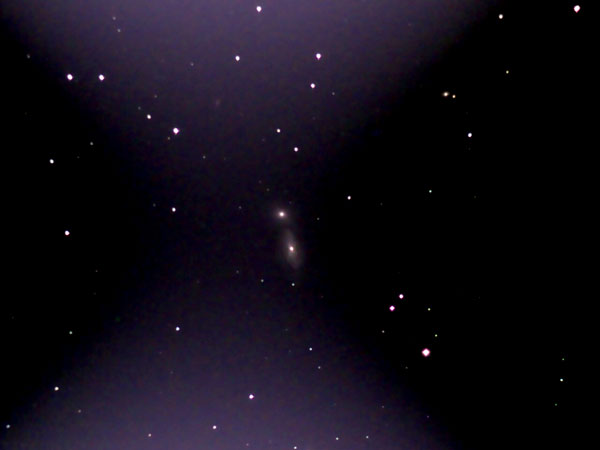 |
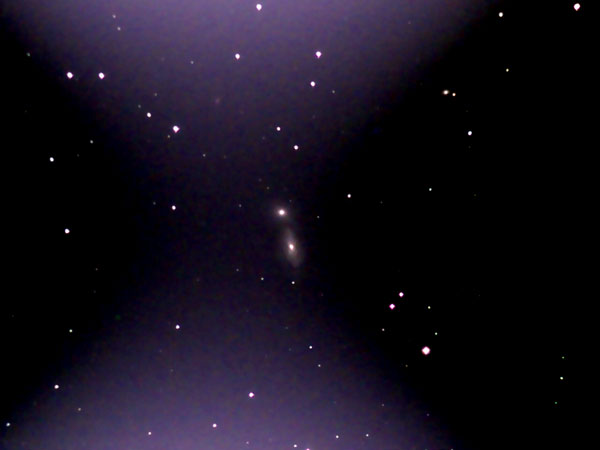 |
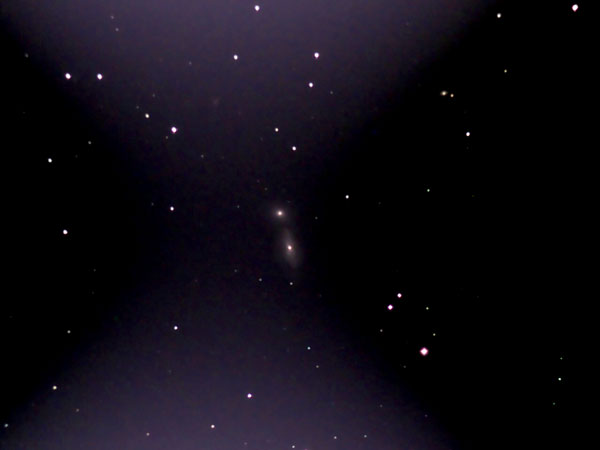 |
||
NGC 3227 - Mar 6, 2021, processed; NGC 3226 on top |
NGC 3227 - Mar 6, 2021, processed; NGC 3226 on top |
NGC 3227 - Mar 6, 2021, processed; NGC 3226 on top |
The barred spiral galaxy NGC 3227 in the constellation Leo interacts with the elliptical galaxy NGC 3226 and forms a group with it (Arp 94 or Holm 187).
NGC 3607/05/08 (Galaxy Trio Holm 240; Leo)
Galaxy trio Holm 240 with NGC 3607/05/08 in the constellation Leo; can be seen together with UGC 6296 (bottom right; image moved higher up in order to see UGC 6296) and NGC 3599 (not visible).
NGC 3842 (Abell 1637, Leo Cluster; Leo)
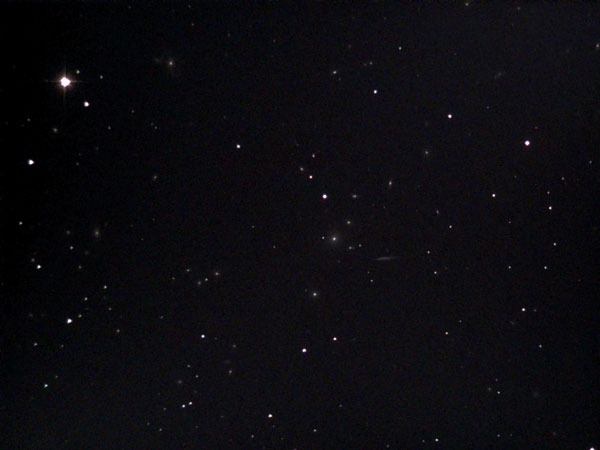 |
 |
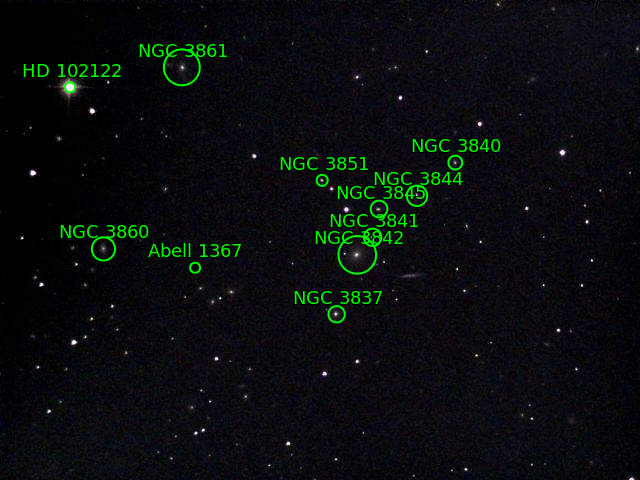 |
||
NGC 3842 - May 31, 2021 |
NGC 3842 - May 31, 2021, photo left processed (Polarr) |
Result of the object search* with astrometry.net |
*) Galaxies found: NGC 3861, NGC 3860, NGC 3837, NGC 3851, NGC 3842, NGC 3841, NGC 3845, NGC 3844, NGC 3840
The elliptical galaxy NGC 3842 in the constellation Leo is the brightest galaxy in the galaxy cluster Abell 1637, also called Leo Cluster. On my eVscope photo, you can find a number of other galaxies (also with the help of astrometry.net).
According to Wikipedia, the largest members of Abell 1637 are: NGC 3842, NGC 3883, NGC 3884, NGC 3861A and B, NGC 3837, UGC 6697, NGC 3862, NGC 3864. All in all, the Leo Cluster comprises more than 500 galaxies. I myself was able to identify 10 galaxies: NGC 3861, NGC 3860, NGC 3837, NGC 3851, NGC 3842, NGC 3841, NGC 3845, NGC 3844, NGC 3840, UGC 6697
NGC 4216 with NGC 4206 and NGC 4222 (Virgo)
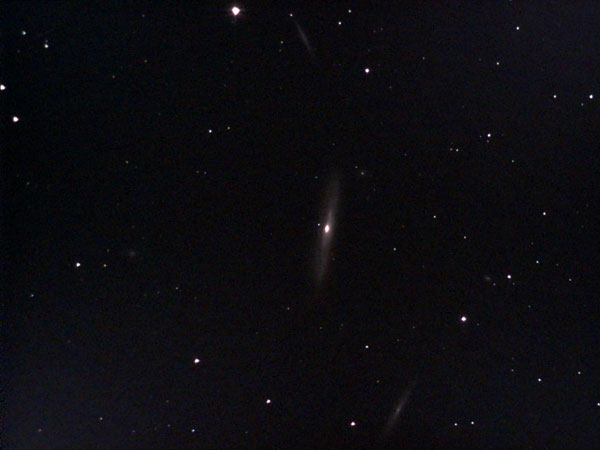 |
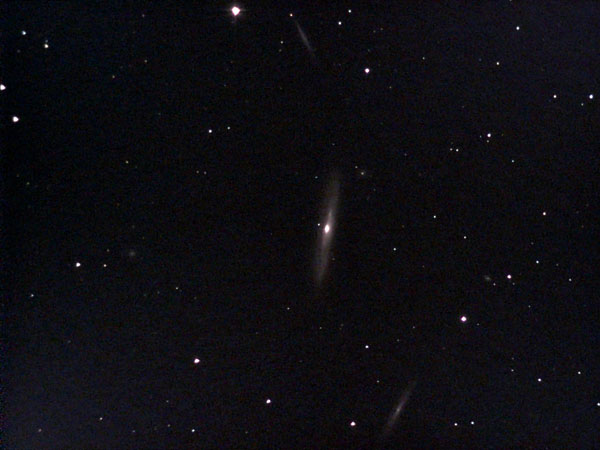 |
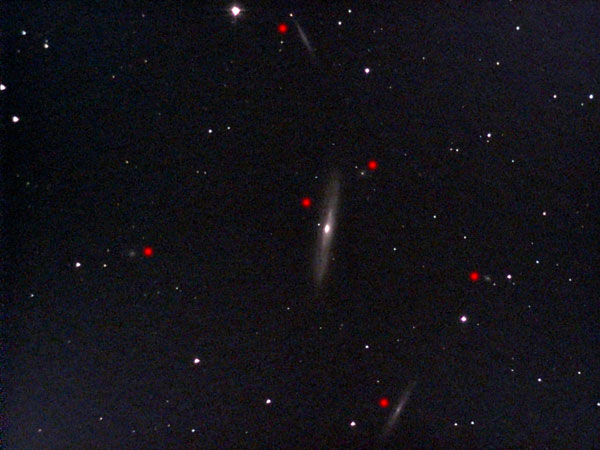 |
||
NGC 4216 - May 31, 2021 |
NGC 4216 - May 31, 2021, processed (Polarr) |
|
NGC 4216 - May 31, 2021, processed (Polarr), galaxies marked* |
*) Galaxies from left to right: PGC 39331?, NGC 4222 (top), NGC 4216 (center), PGC 39247 (next to NGC 4216), NGC 4206 (bottom), IC 771 (right)
The spiral galaxy NGC 4216 in the constellation Virgo, which is accompanied by the spiral galaxies NGC 4206 and NGC 4222 (Coma Berenices).
NGC 4298/NGC 4302 (Holm 377 or KPG 332; Coma Berenices)
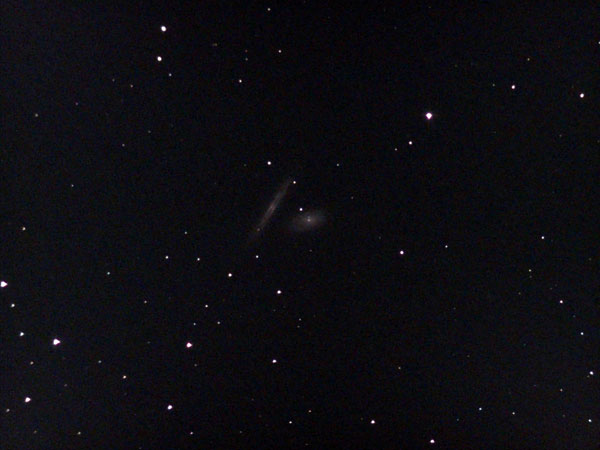 |
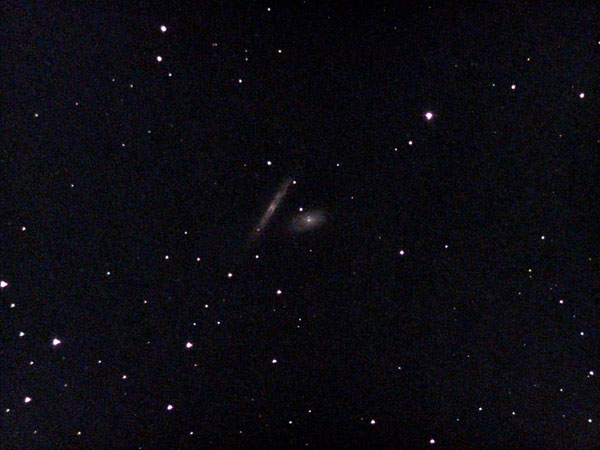 |
|
NGC 4298 - May 31, 2021, with NGC 4302 to the left |
NGC 4244 - May 31, 2021, photo left processed (Polarr) |
The spiral galaxies NGC 4298 and NGC 4302 in the constellation Coma Berenices form an interacting pair (Holm 377 or KPG 332).
NGC 4435/38 (The Eyes; Virgo) with and without NGC 4461/58
The lenticular galaxies NGC 4435 and NGC 4438 in the constellation Virgo form "The Eyes" or also called "Eyes Galaxies". When "the Eyes" are moved towards the bottom right, you can also see the galaxies NGC 4461 (lenticular) and NGC 4458 (elliptical) in the same field of view with the eVscope (bottom row).
NGC 4490, NGC 4485 (Cocoon Galaxies; Arp 269, Holm 414 or KPG 341; Canes Venatici)
The galaxies NGC 4490 and NGC 4485 in the constellation Canes Venatici are connected and are therefore also called "Cocoon Galaxies." Both are spiral galaxies that were distorted by colliding with each other. They form an interacting pair of galaxies (Arp 269, Holm 414, or KPG 341).
NGC 4567/68 (Siamese Twins, Butterfly Galaxies; Virgo)
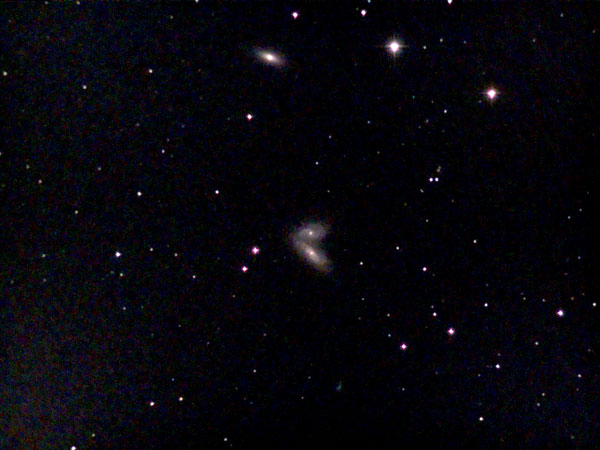 |
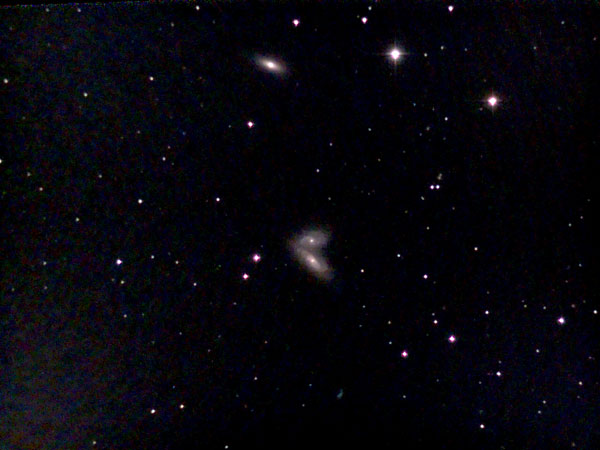 |
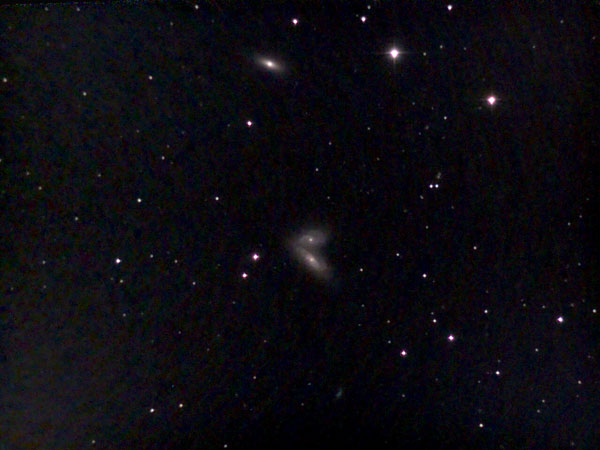 |
||
NGC 4567/68 - Mar 8, 2021, processed |
NGC 4567/68 - Mar 8, 2021, processed |
|
NGC 4567/68 - Mar 8, 2021, processed |
NGC 4567/8 are two spiral galaxies in the Virgo cluster (constellation Virgo); they are also called "The Siamese Twins" or "The Butterfly Galaxies". Above the galaxy pair and a little to the left there is the galaxy NGC 4564.
NGC 4631 (Whale/Herring Galaxy; Canes Venatici) and NGC 4627
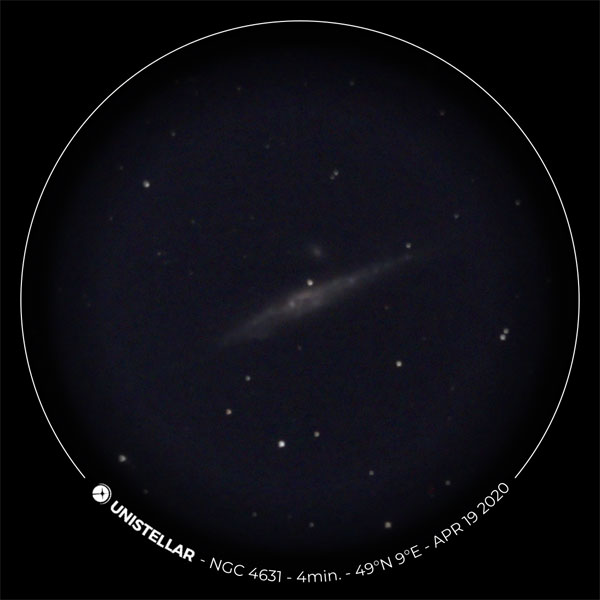 |
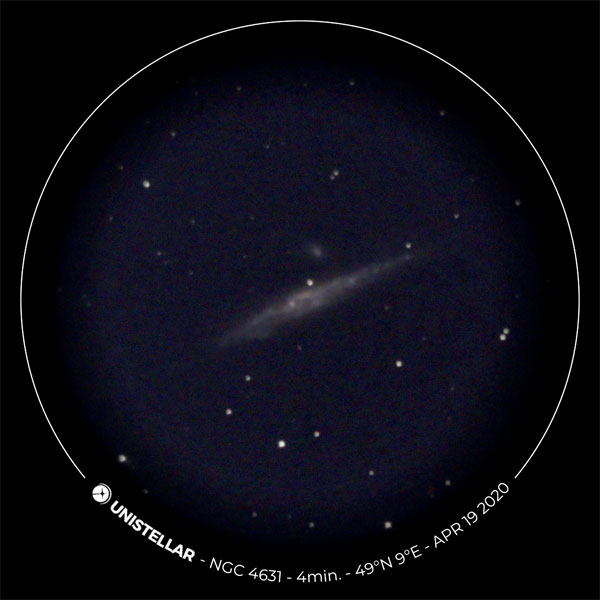 |
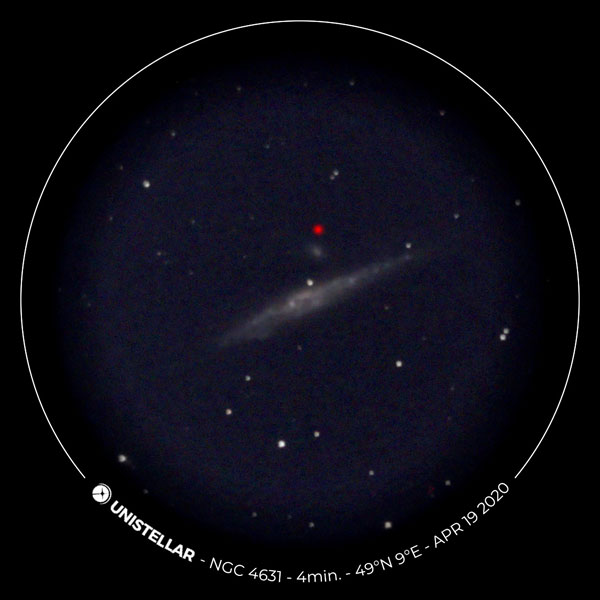 |
||
NGC 4631 (+ NGC 4627) - Apr 19, 2020 |
NGC 4631 (+ NGC 4627) - Apr 19, 2020, processed |
NGC 4631 (+ NGC 4627, marked) - Apr 19, 2020, processed |
The galaxy NGC 4631, called Whale or Herring Galaxy in constellation Canes Venatici can be observed together with the smaller galaxy NGC 4627 in the eVscope.
NGC 4725 (Coma Berenices) and NGC 4712
NGC 4725 is a small spiral galaxy in constellation Coma Berenices, which has an even smaller companion, the spiral galaxy NGC 4712.
NGC 5173 with NGC 5169 and NGC 5198 (Canes Venatici)
The elliptical galaxy NGC 5173 in constellation Canes Venatici is located close to the galaxy M 51 (in a distance of 40'); I observed it just for this reason because I was curious. When observing NGC 5173, two more small galaxies appear in the eVscope's field of view (NGC 5169 (top left) and NGC 5198 (bottom left)). Together with PGC 48012, these galaxies form the NGC 5198 Group.
NGC 5426 and NGC 5427 (Arp 271; Virgo)
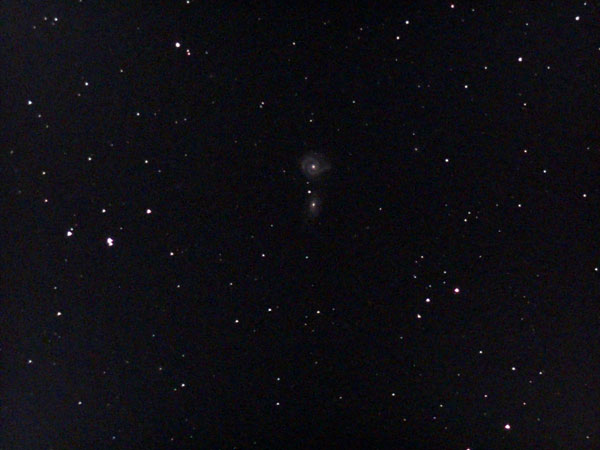 |
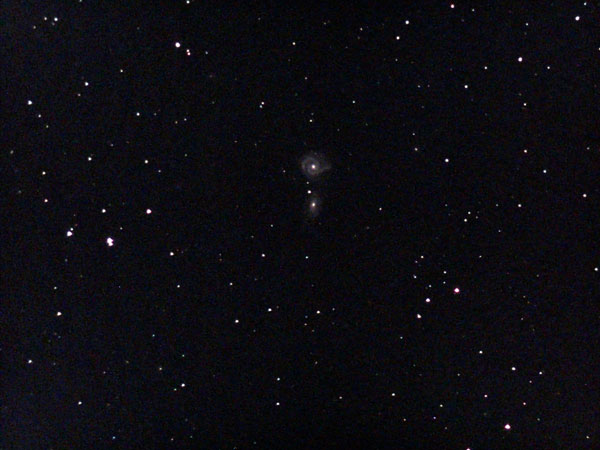 |
|
NGC 5426/27 - May 31, 2021 |
NGC 5426/27 - May 31, 2021, processed (Polarr) |
The spiral galaxies NGC 5426 and NGC 5427 in the constellation Virgo are interacting with one another and form a pair that is called Arp 271.
NGC 5981/82/85 (DracoTriplet; Draco)
 |
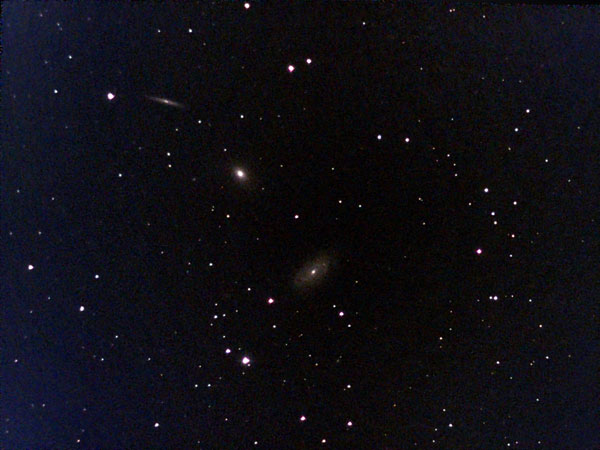 |
|
NGC 5981/82/85* - May 31, 2021 |
NGC 5981/82/85 - May 31, 2021, photo left processed (Polarr) |
*) From top to bottom: NGC 5981, NGC 5982, NGC 5985
The galaxies NGC 5981 (spiral), NGC 5982 (elliptical), and NGC 5985 (spiral) in the constellation Draco form the Draco triplet.
NGC 6041 (Abell 2151, Hercules Cluster; Hercules)
The galaxy cluster Abell 2151 in the constellation Hercules, called Hercules Cluster, with NGC 6041 as its brightest galaxy is located at a distance of about 500 million light years and the galaxies are rather small in the eVscope. According to the English Wikipedia, the cluster contains more than 300 galaxies (according to the German Wikipedia more than 100).
I had one of my photos of Abell 2151 evaluated by Astrometry.net. The following galaxies were found (as far as I was able to decipher the labels...):
- Abell 2151
- IC 1170, IC 1171, IC 1172 (NGC 6044), IC 1173, IC 1178, IC 1179, IC 1181, IC 1182, IC 1183 (NGC 6054), IC 1184, IC 1185
- NGC 6039 (NGC 6042), NGC 6040, NGC 6041, NGC 6042 (NGC 6039), NGC 6043, NGC 6044 (IC 1172), NGC 6045, NGC 6047, NGC 6050, NGC 6054 (IC 1183)
NGC 7317 (Stephan's Quintet; Pegasus)
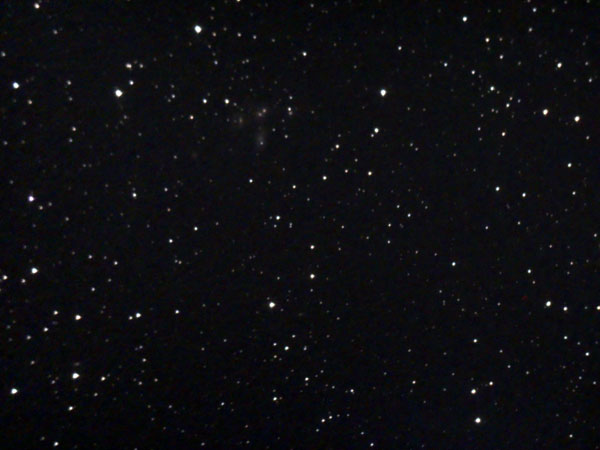 |
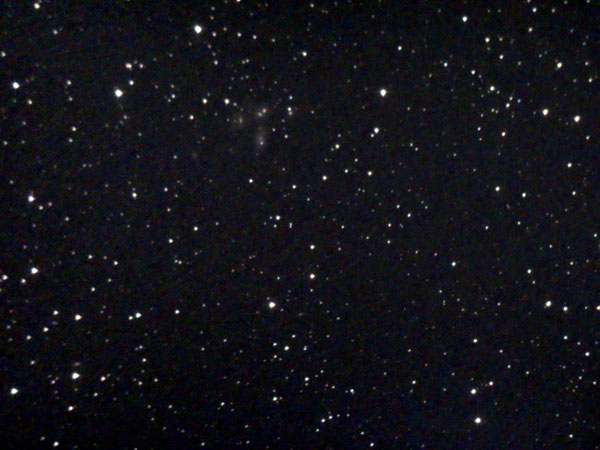 |
|
NGC 7317 - Aug 23, 2020 |
NGC 7317 - Aug 23, 2020, processed |
|
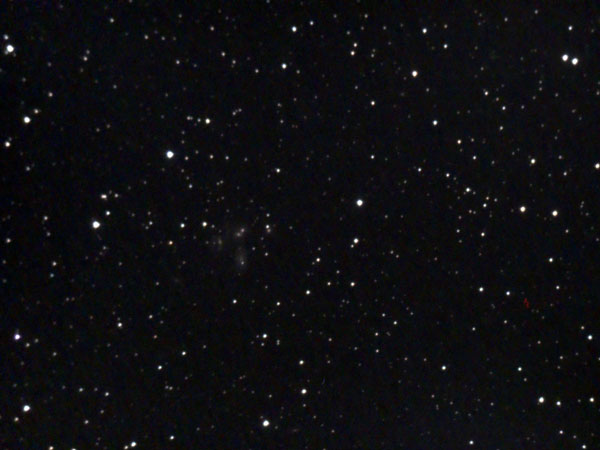 |
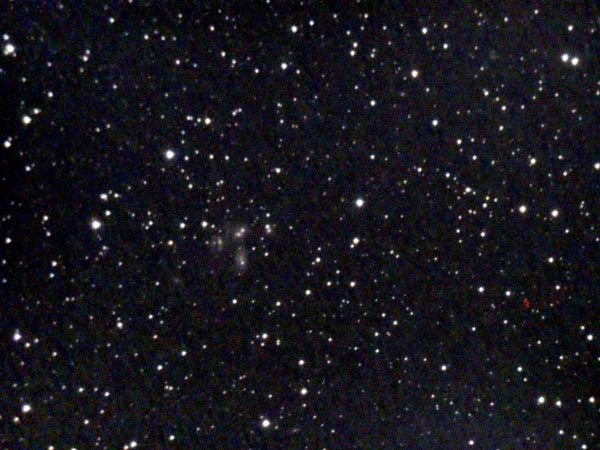 |
|
NGC 7317 - Aug 24, 2020 |
NGC 7317 - Aug 24, 2020, processed |
The galaxy NGC 7317 in the constellation Pegasus is part of Stephan's Quintet, a group of small galaxies. In the eVscope it is very small. It is located close to the galaxy NGC 7331.
NGC 7331 (Pegasus)
The spiral galaxy NGC 7331 in the constellation Pegasus is according to Stoyan only visible in telescopes. It is seen nearly edge-on. Close to it, there are the galaxy NGC 7335 and three even smaller ones (NGC 7336, NGC 7337 and NGC 7340). And also close to it, there is Stephan's Quintet (NGC 7317). With shorter focal lengths (e.g. Vaonis Vespera), it can be seen together with NGC 7331 in the same field of view.
NGC 7332/7339 (Pegasus)
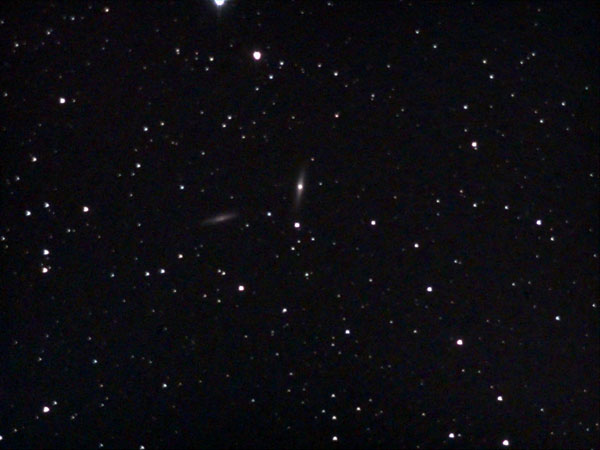 |
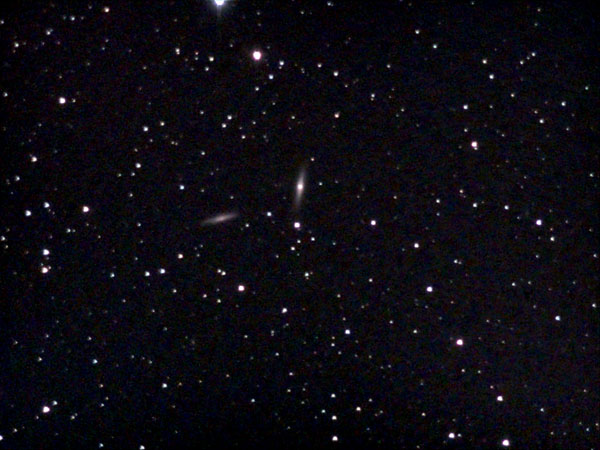 |
|
NGC 7332/39 - Oct 9, 2021 |
NGC 7332/39 - Oct 9, 2021, processed |
The lenticular galaxy NGC 7332 and the barred spiral galaxy NGC 7339 in the constellation Pegasus are located close to each other so that they can be observed together in the eVscope.
Links
- Unistellar Website: unistellaroptics.com
- eVscope Kickstarter campaign: www.kickstarter.com/projects/unistellar/evscope-100-times-more-powerful-than-a-classical-t/
- See also my page offering Astronomy Links.
| 11.06.2024 |

